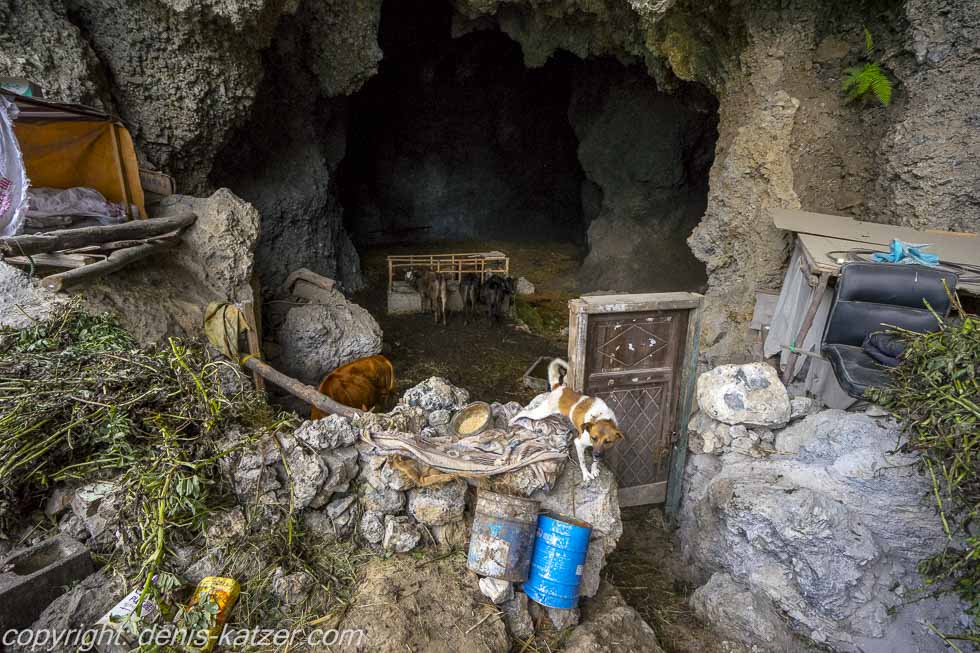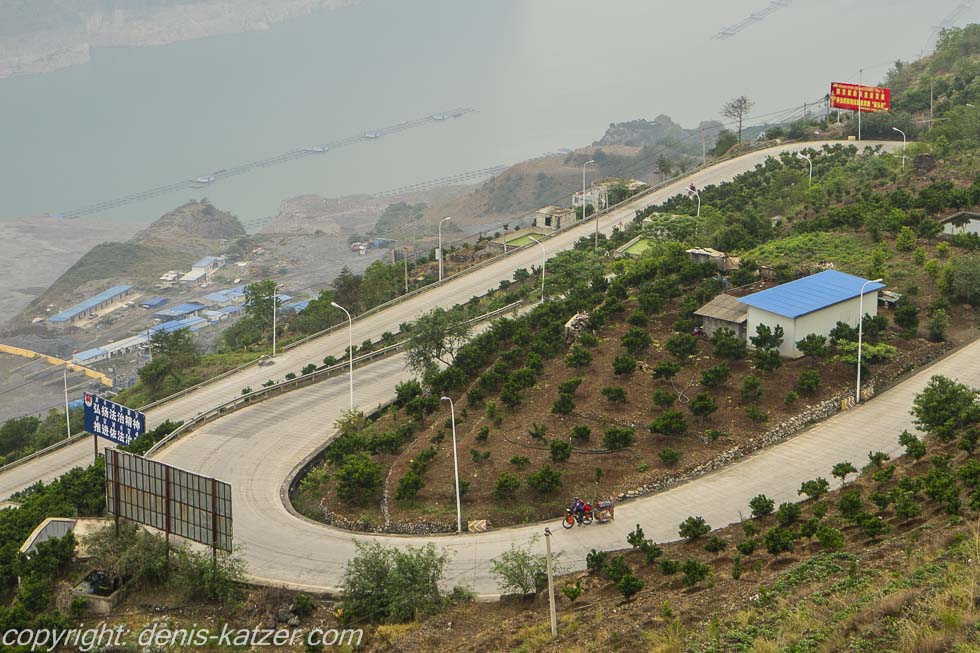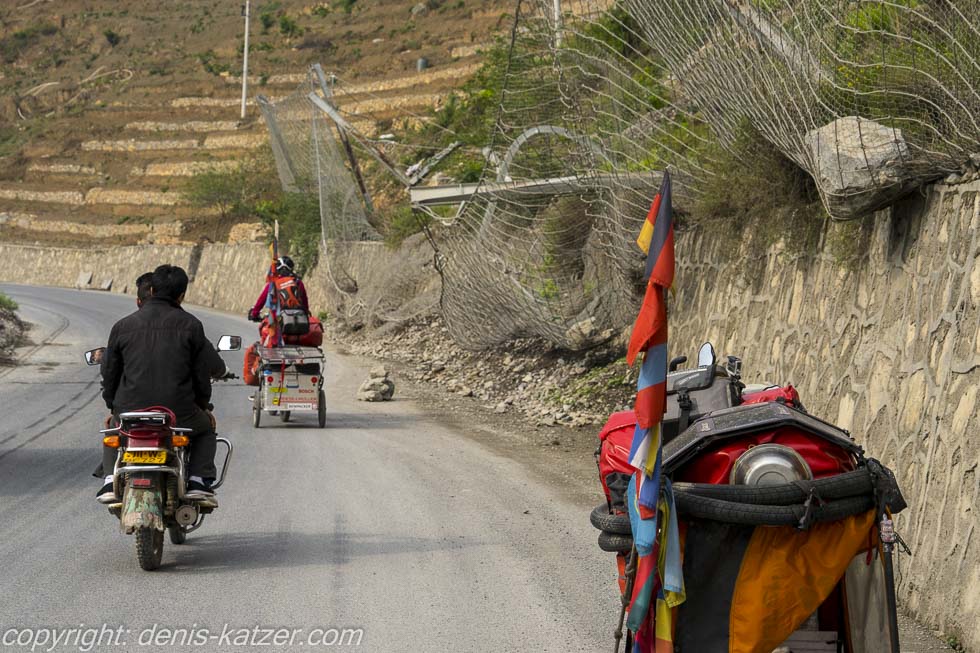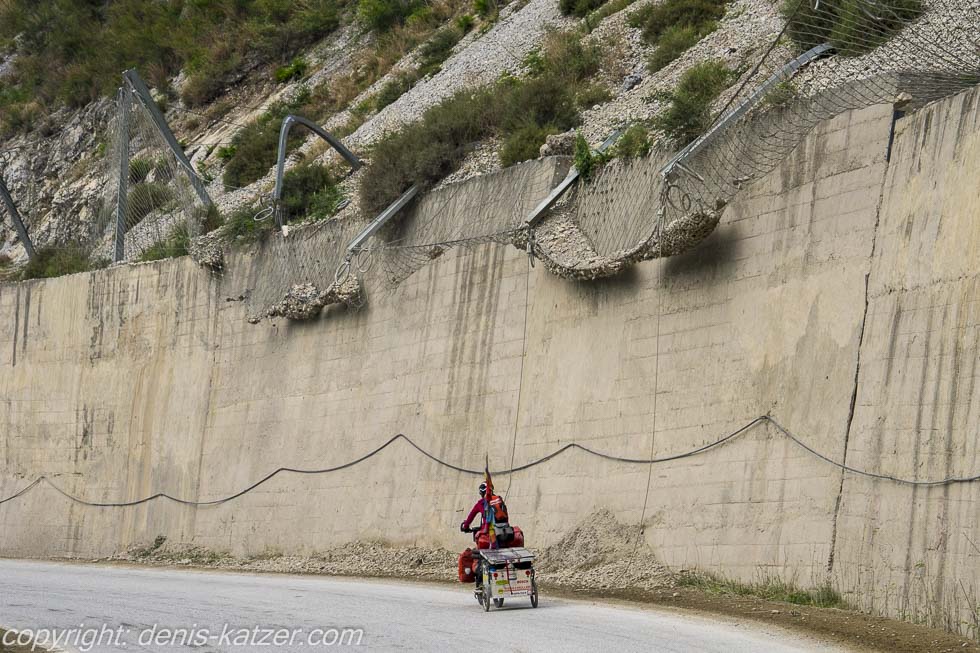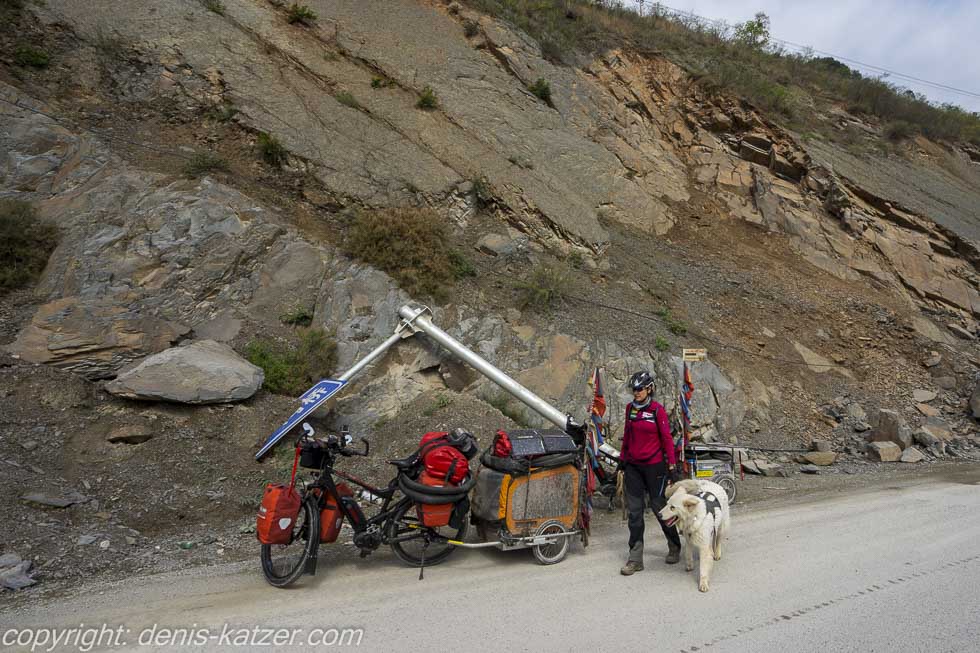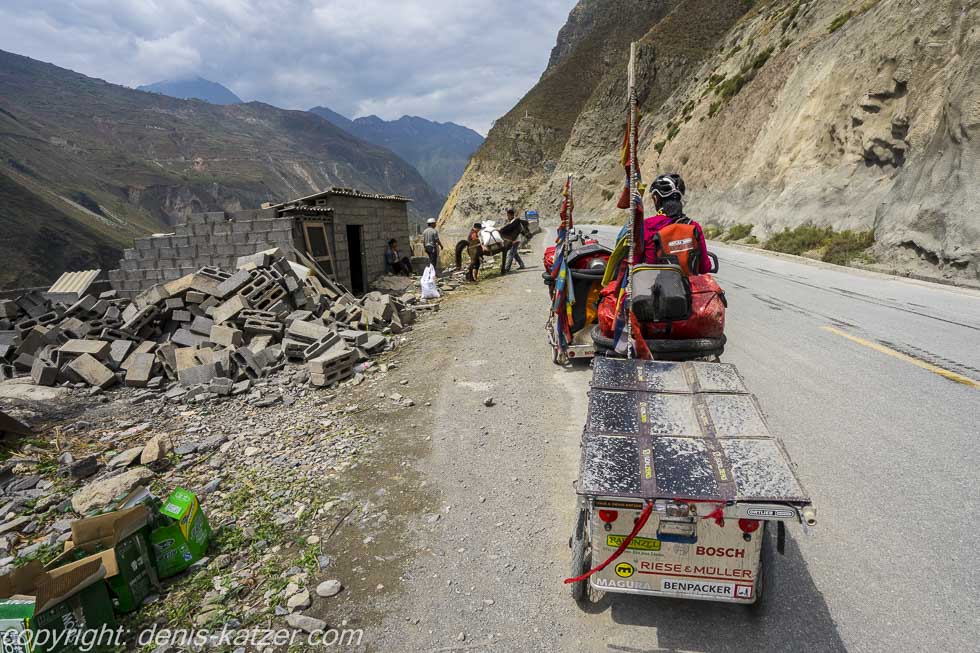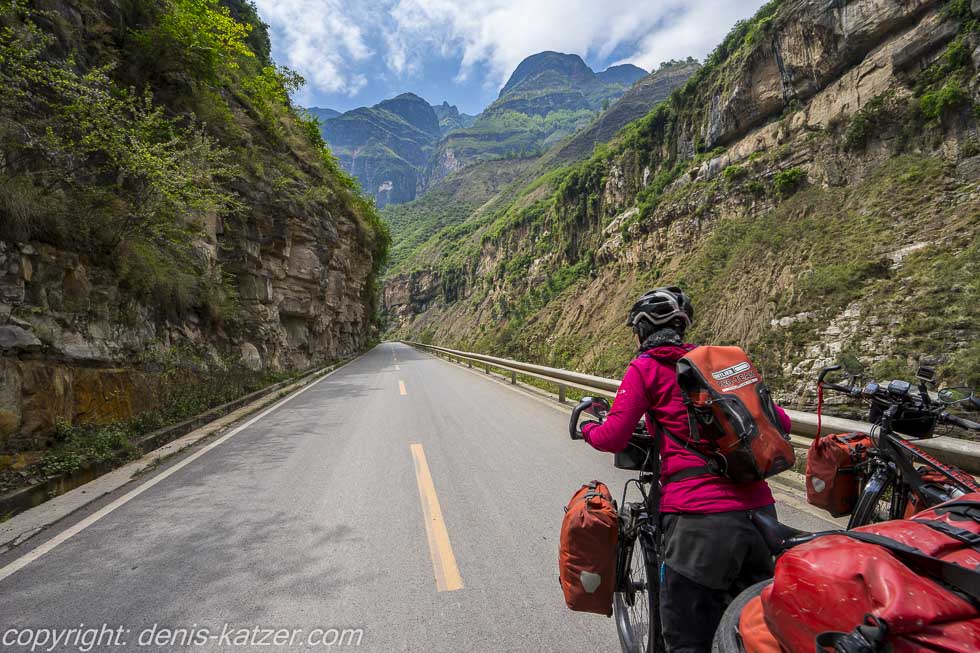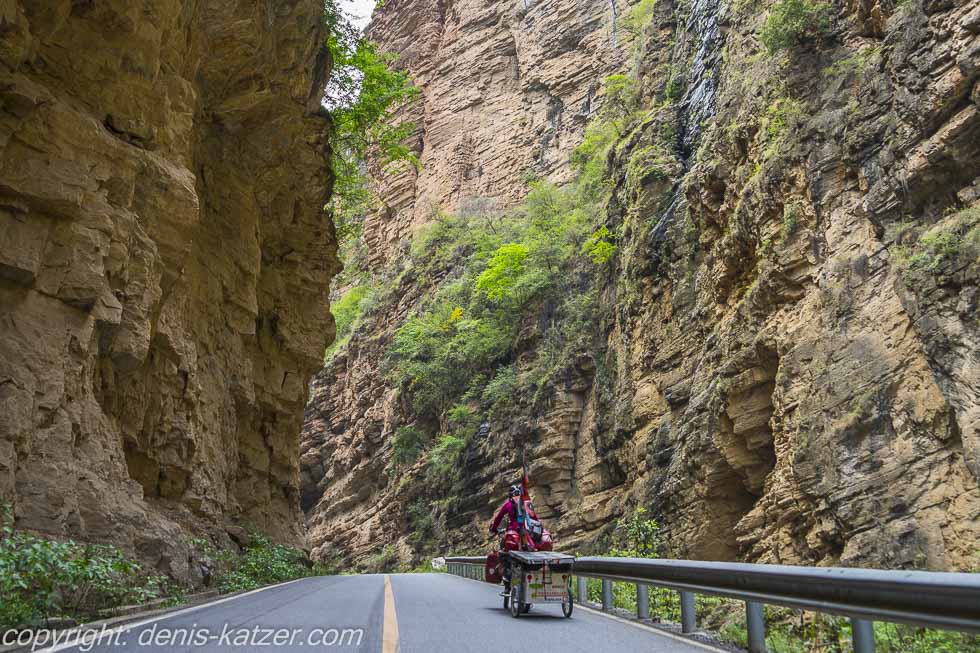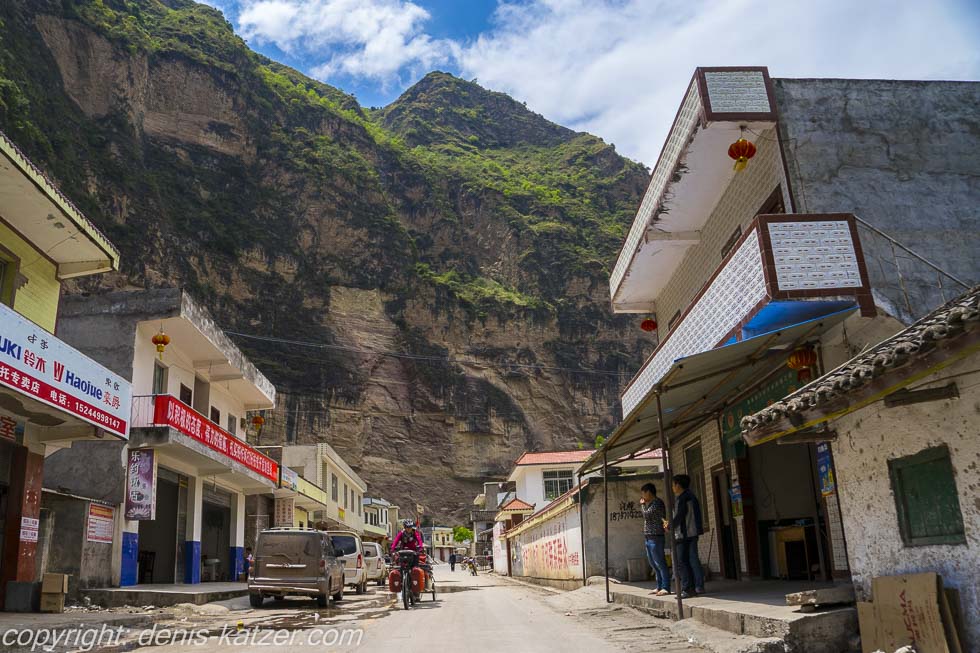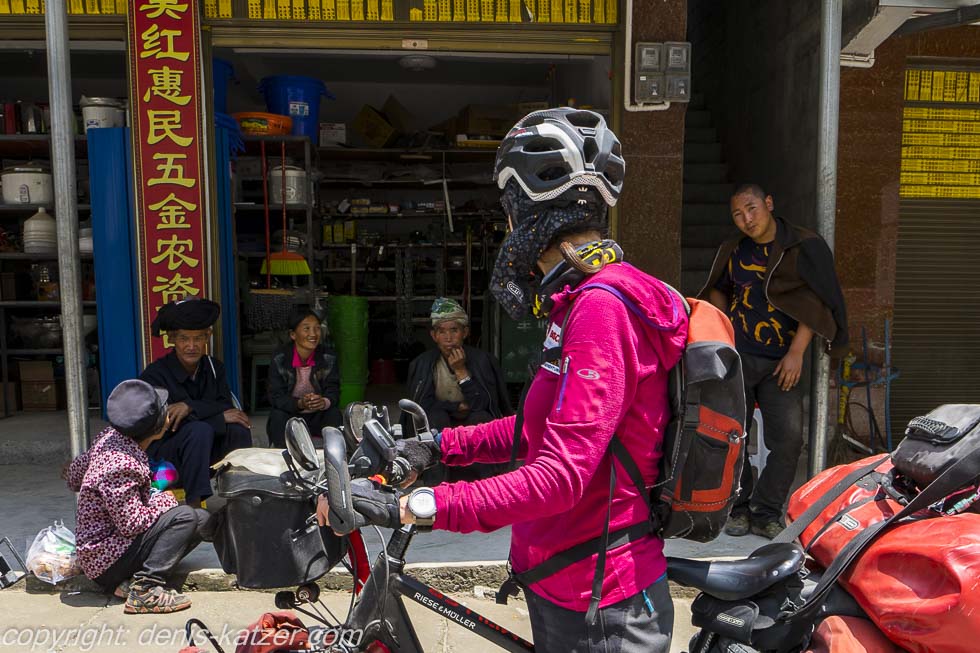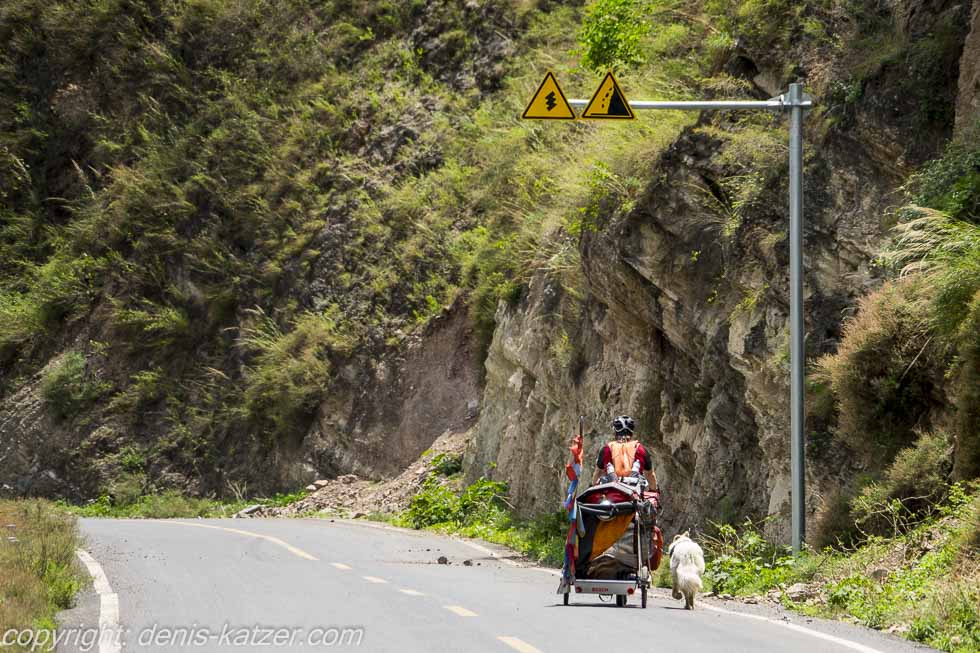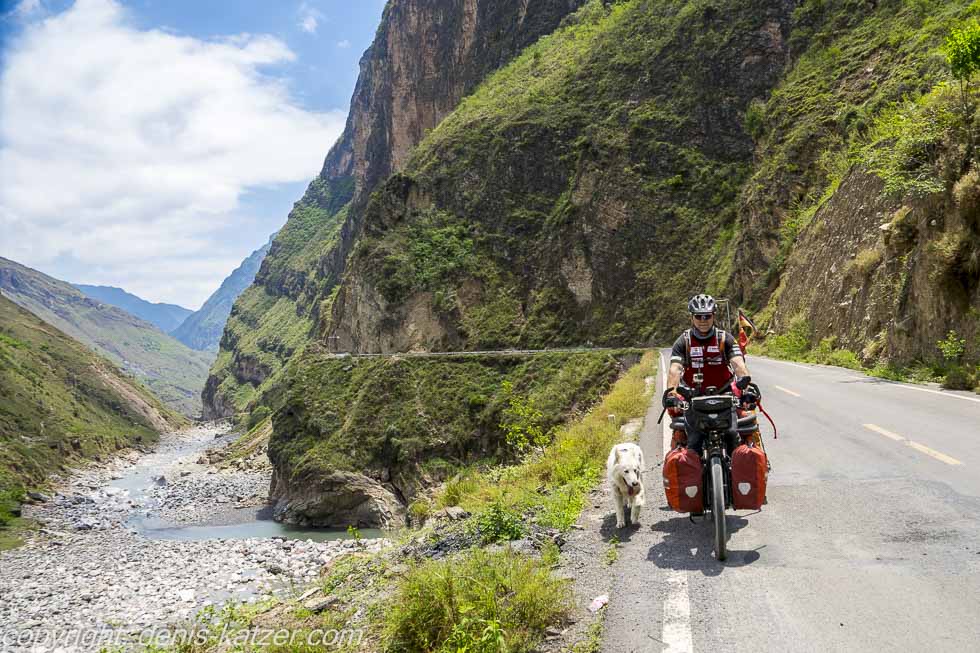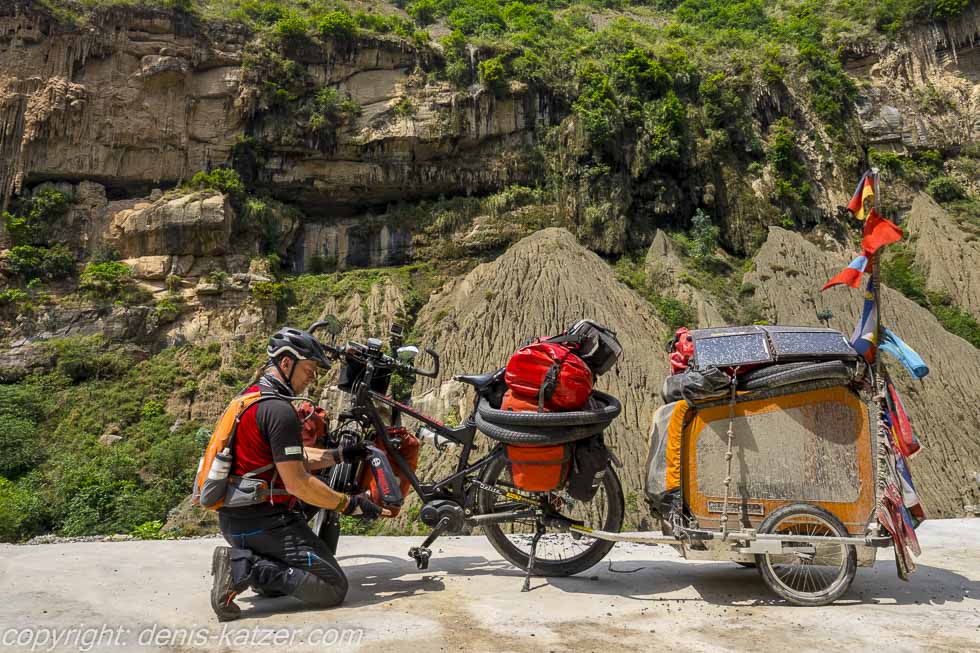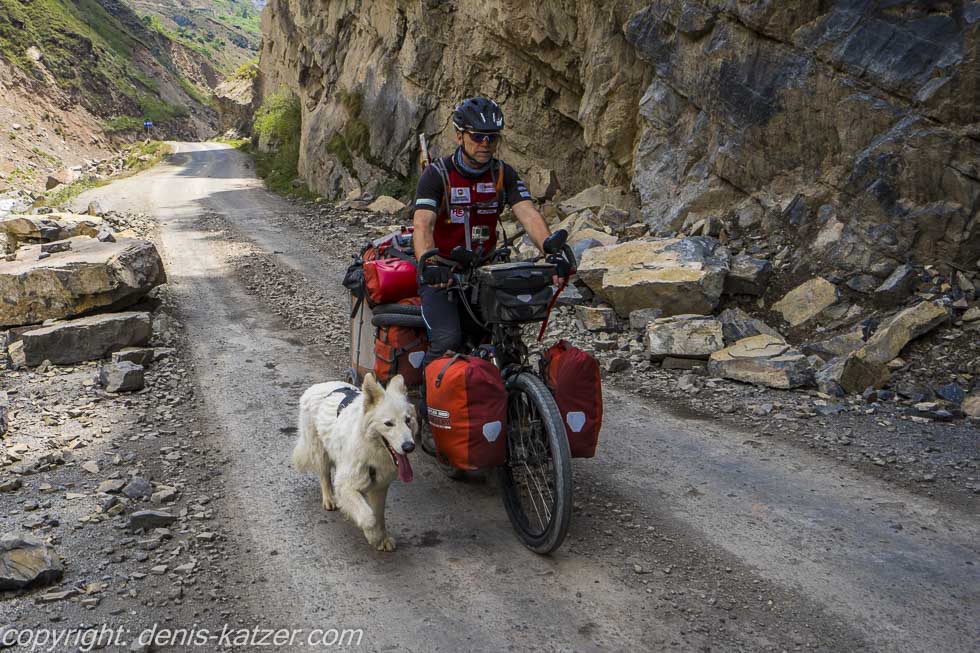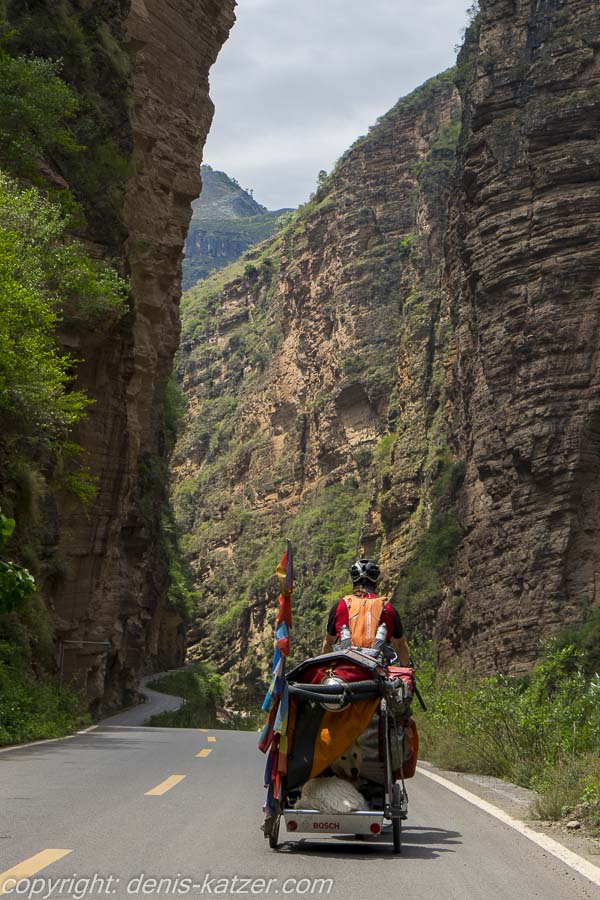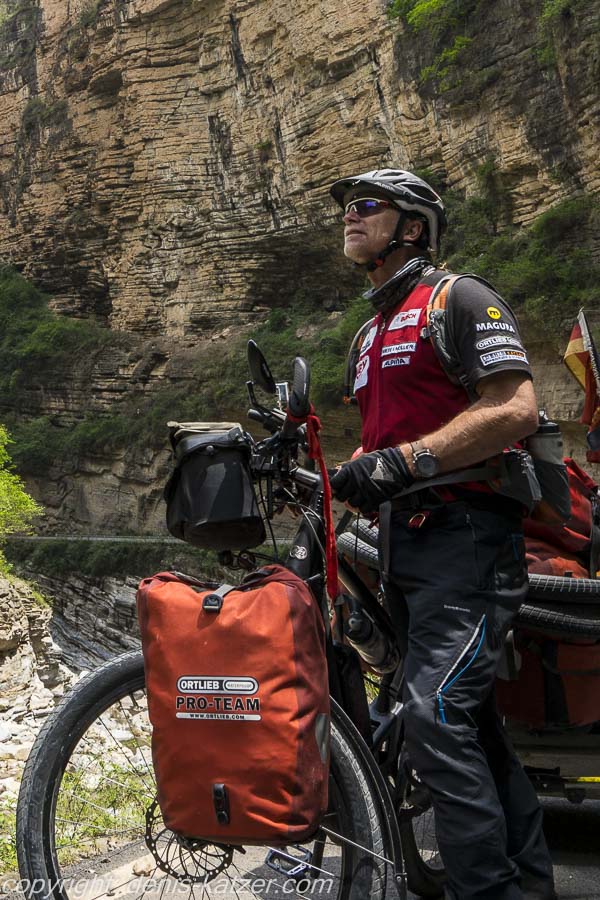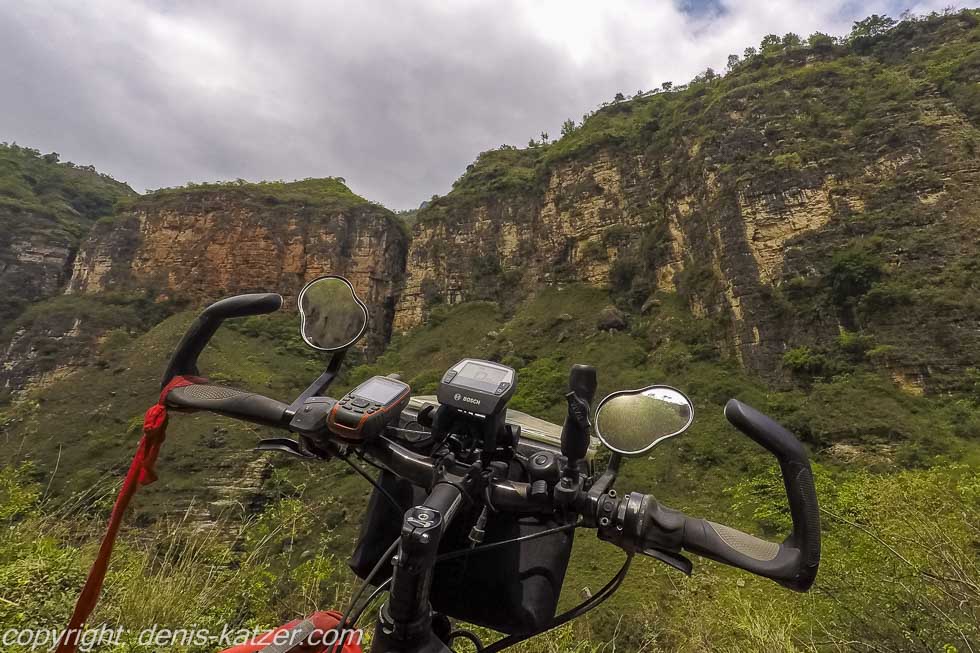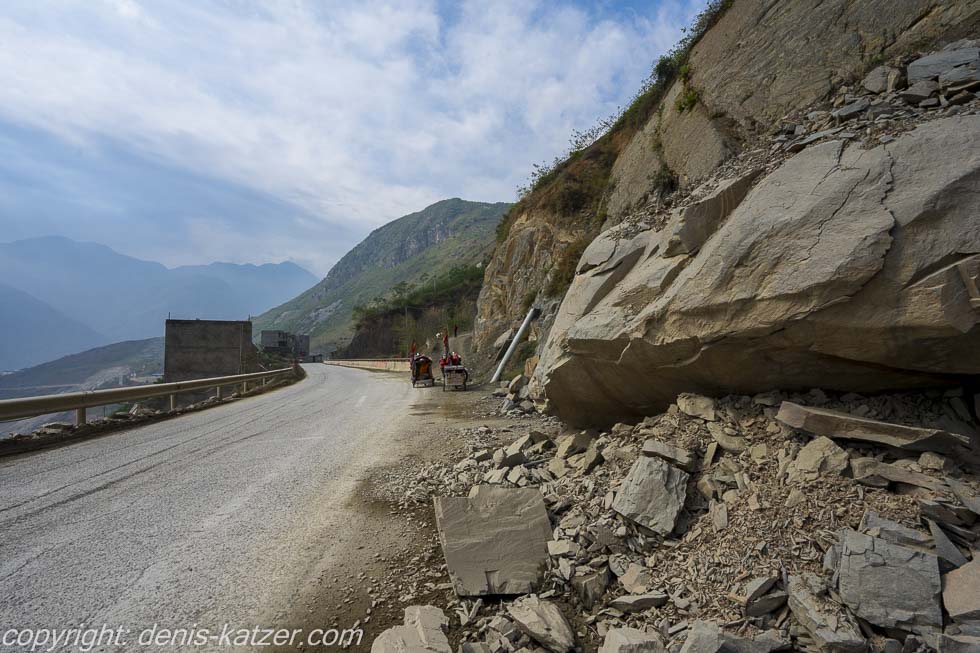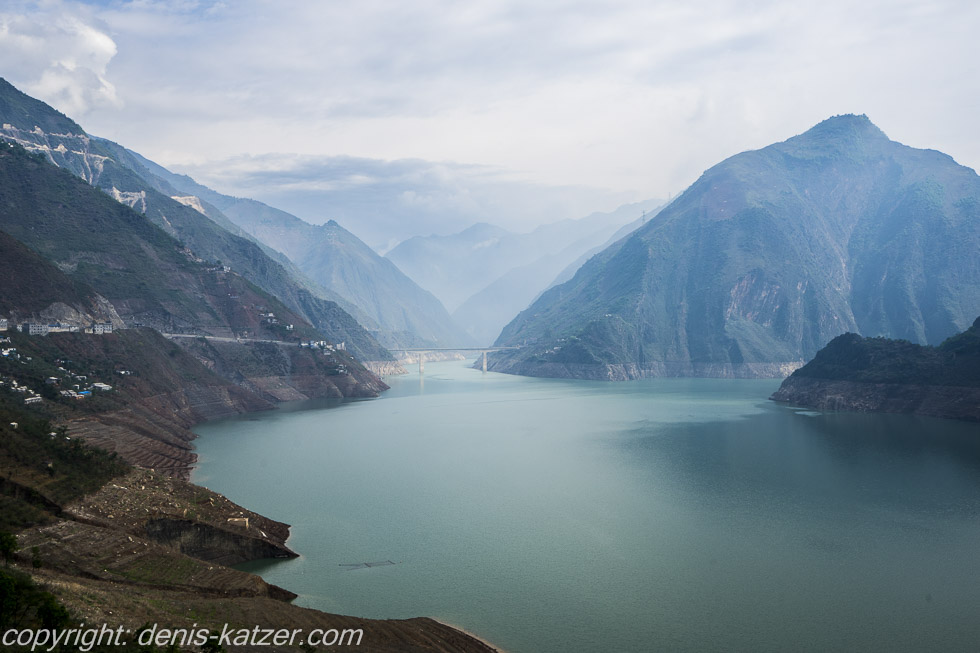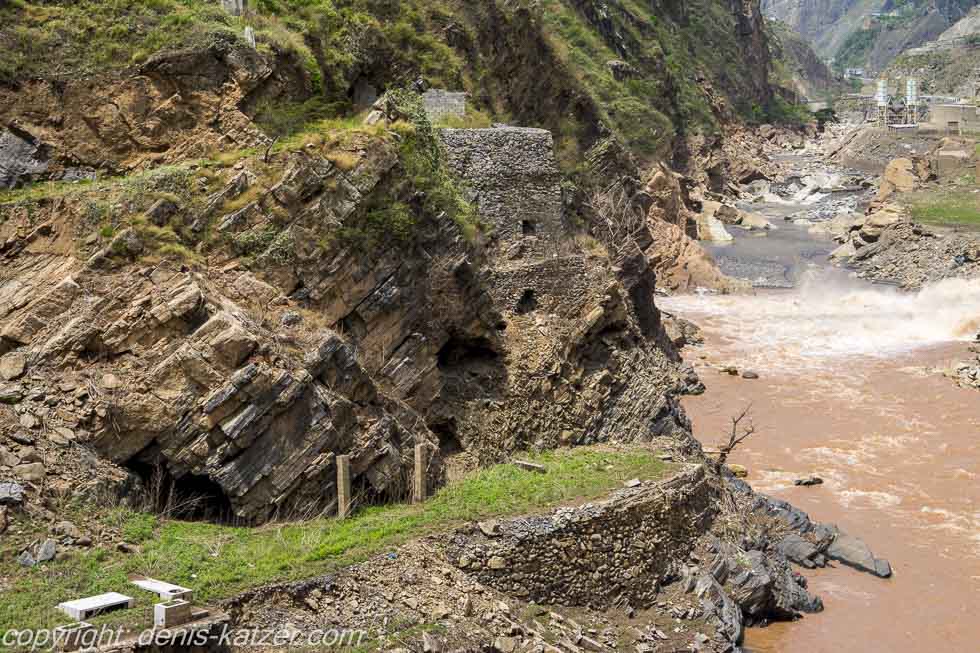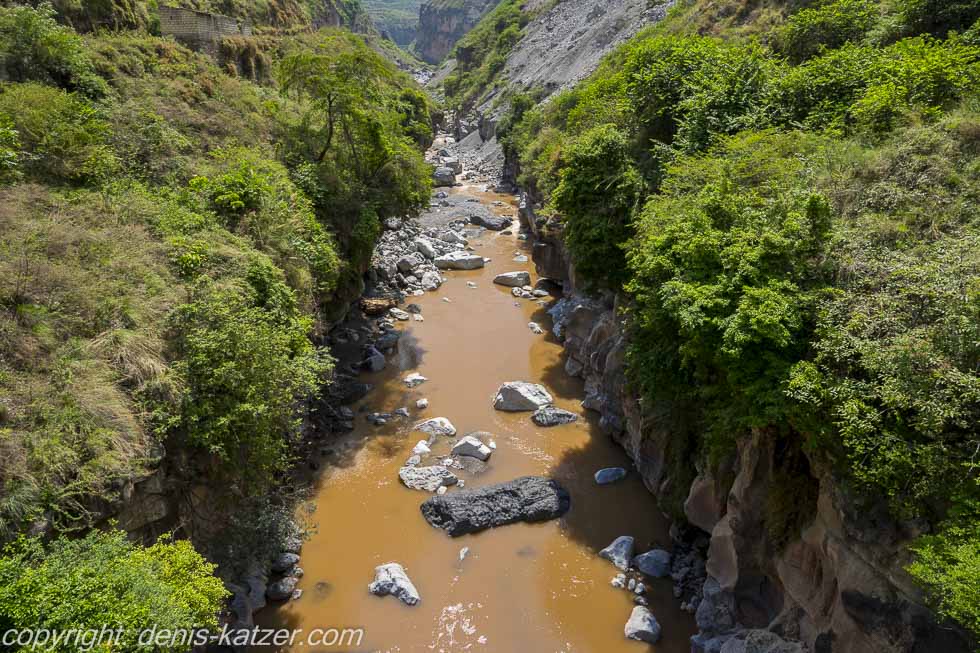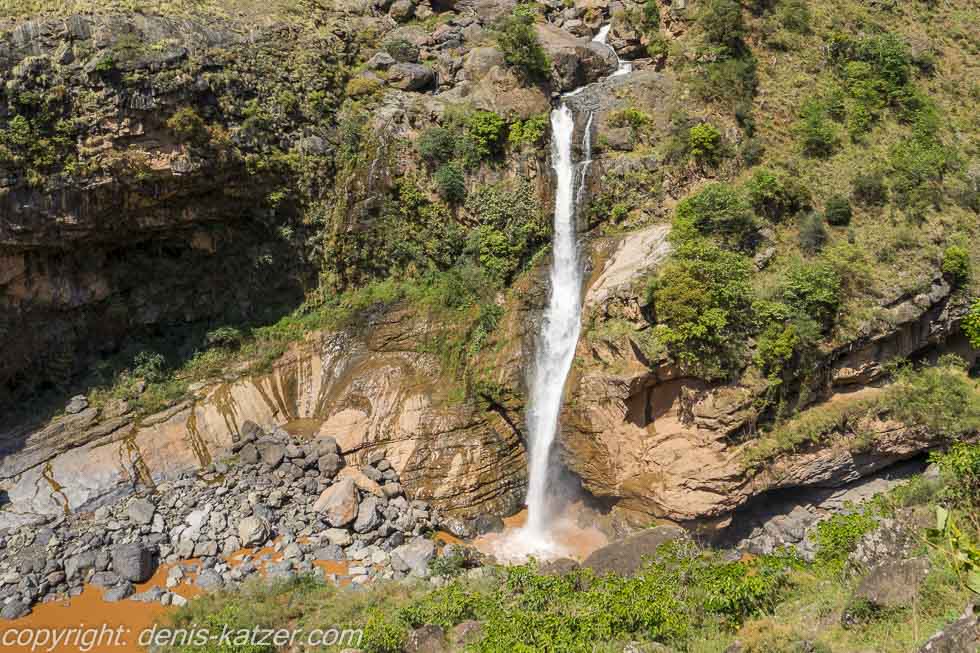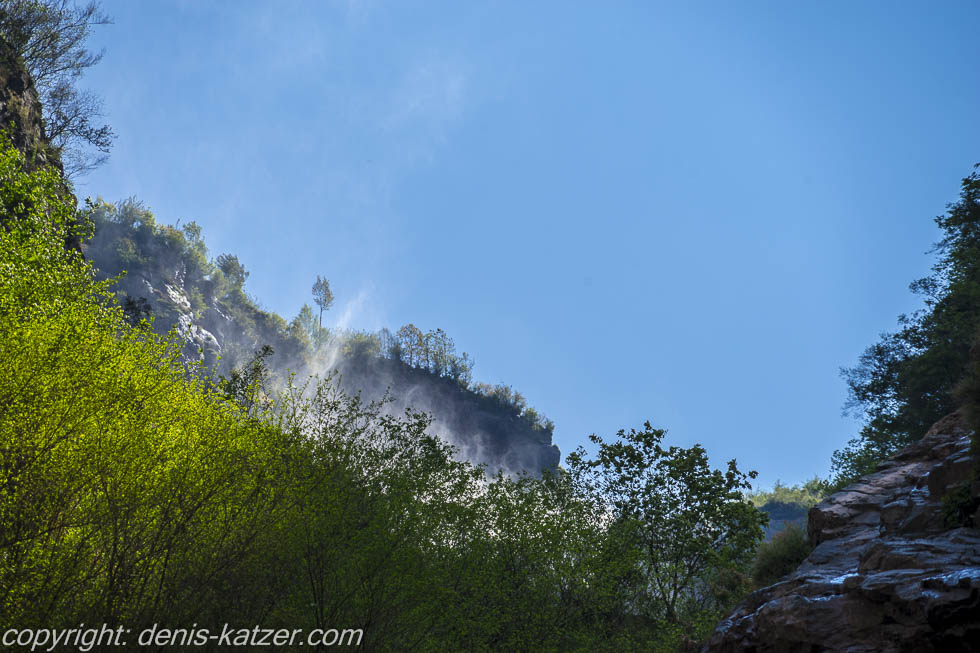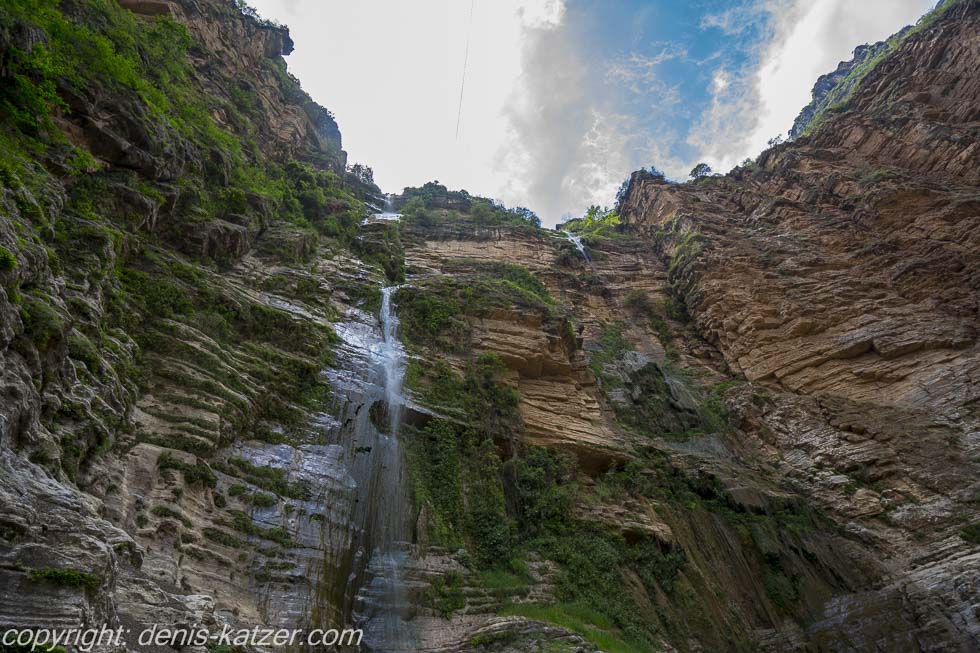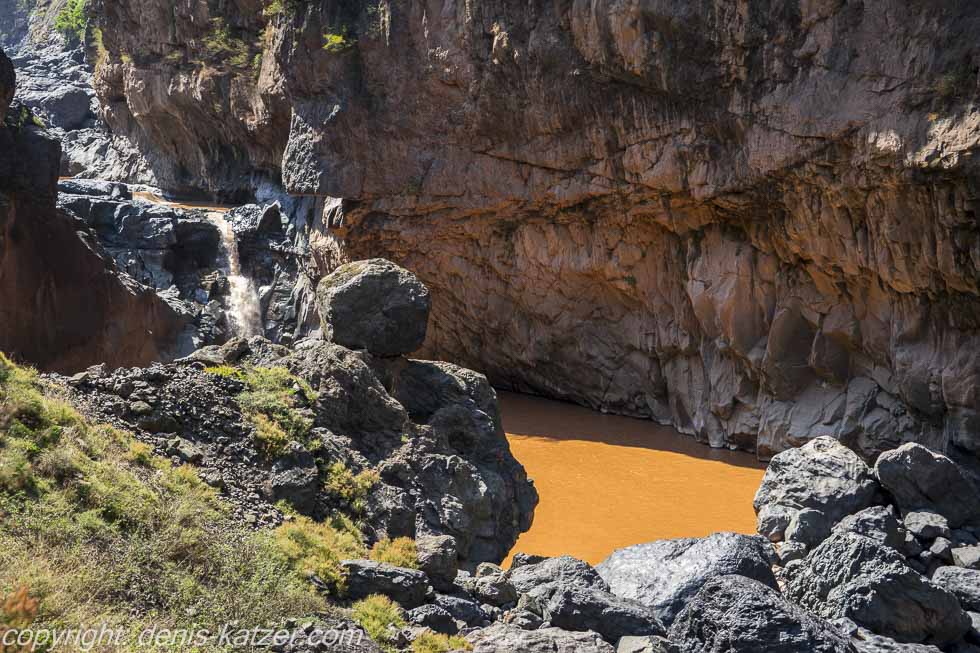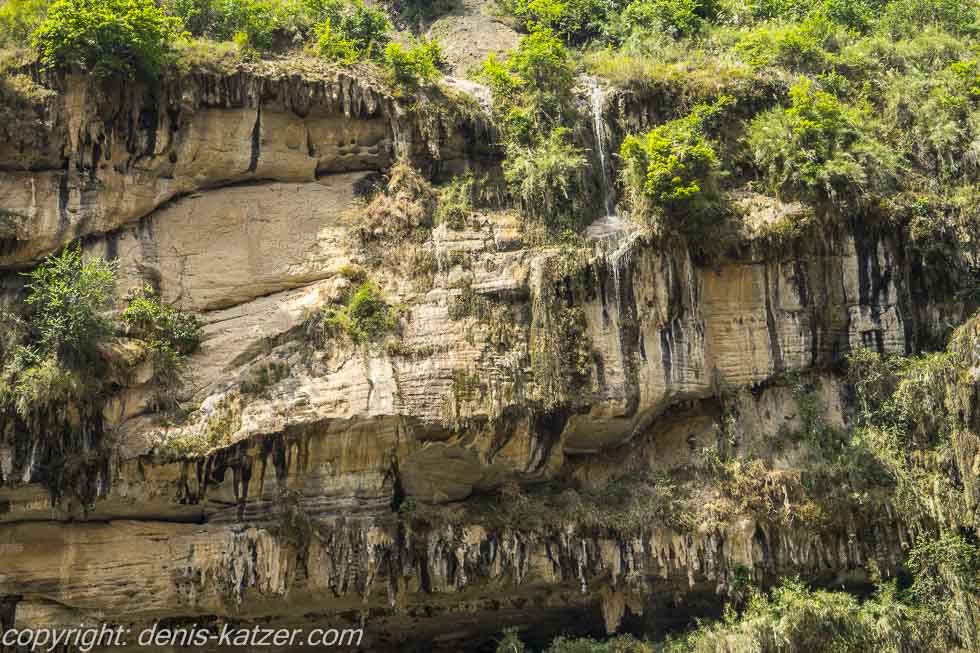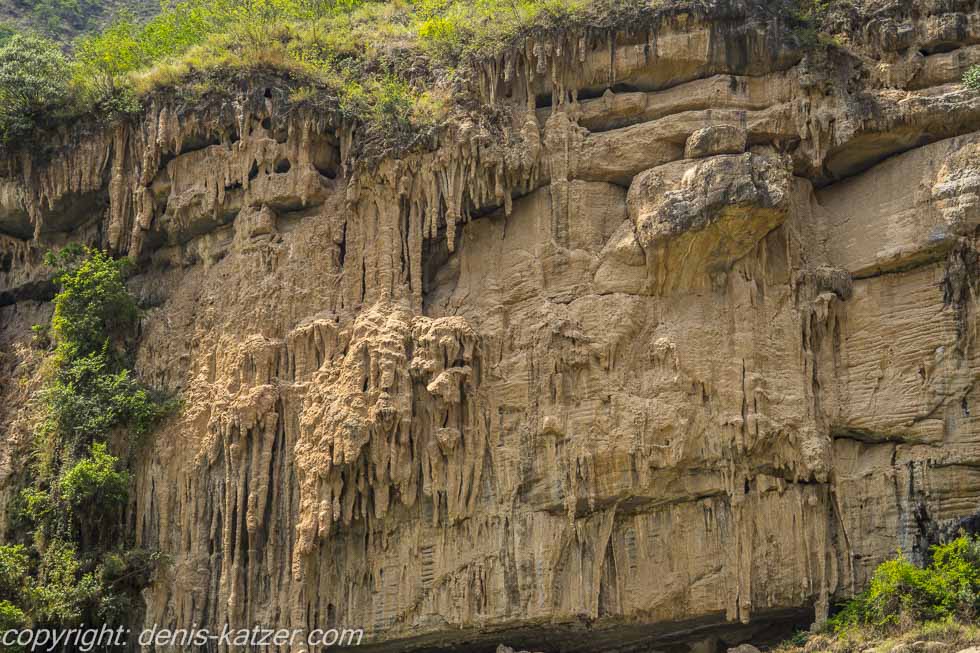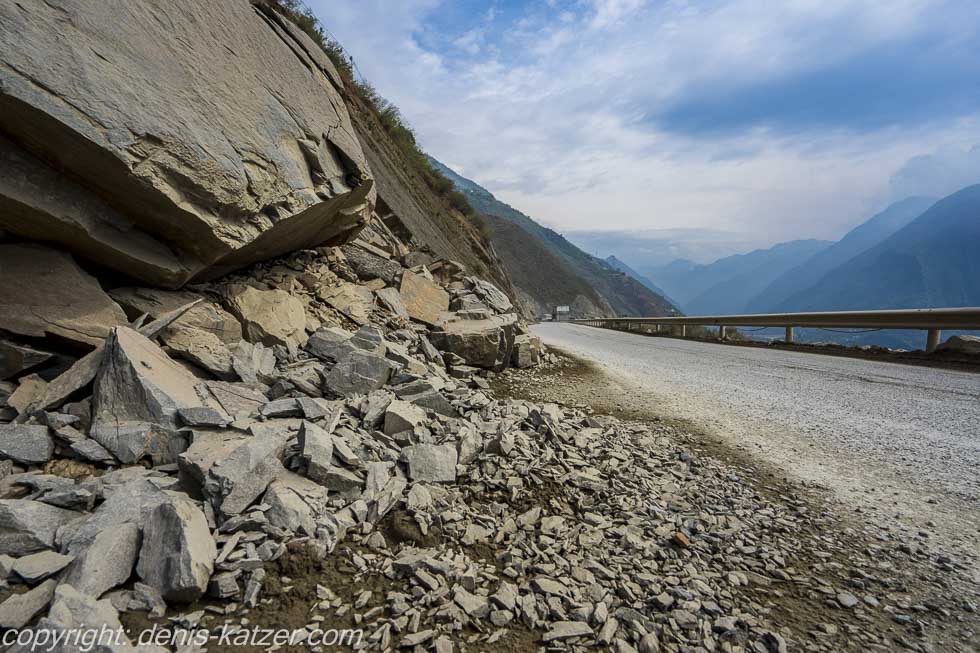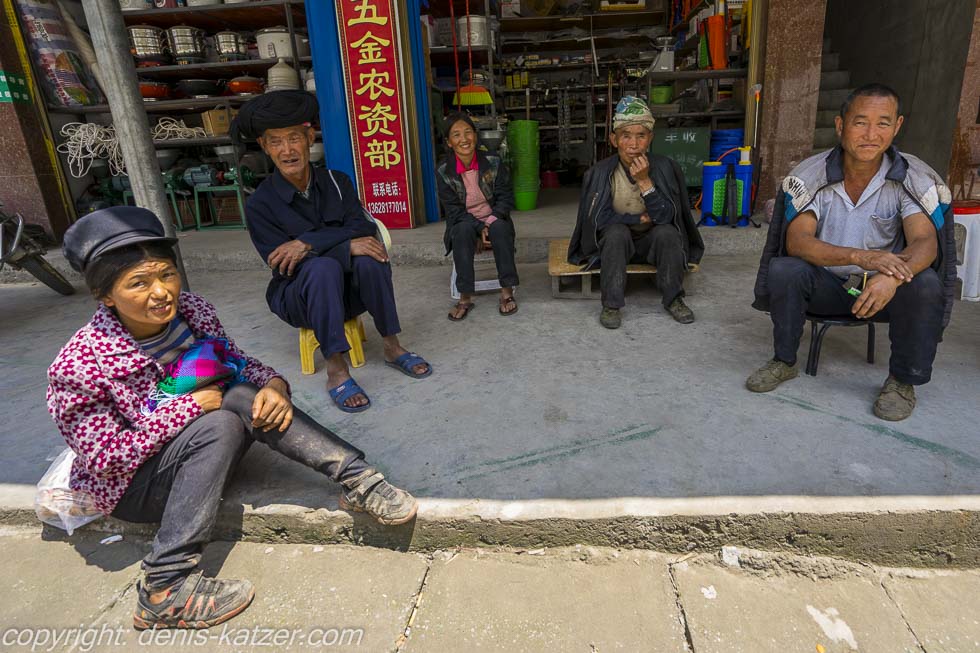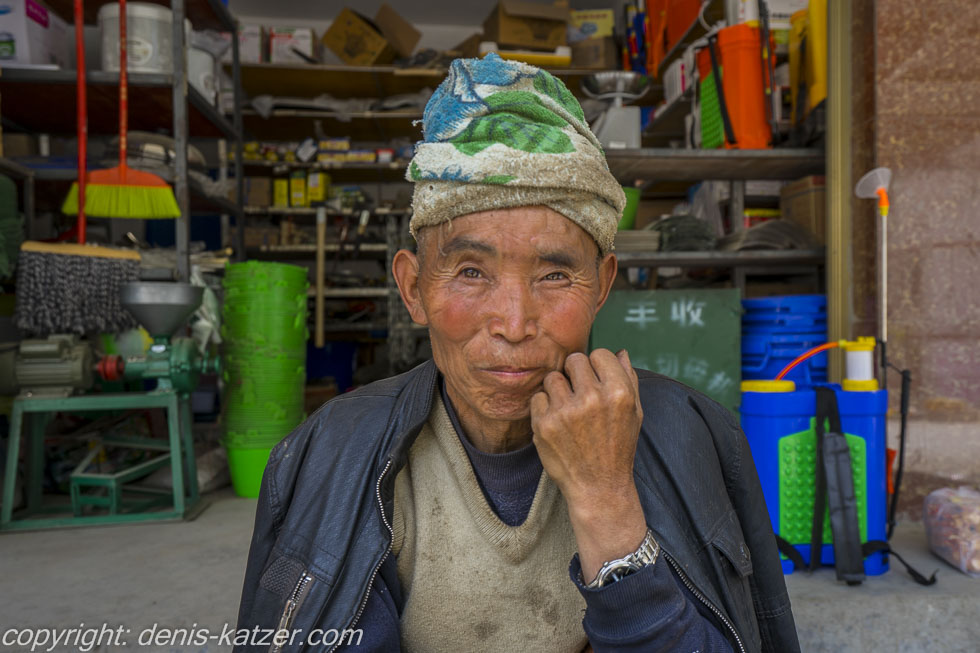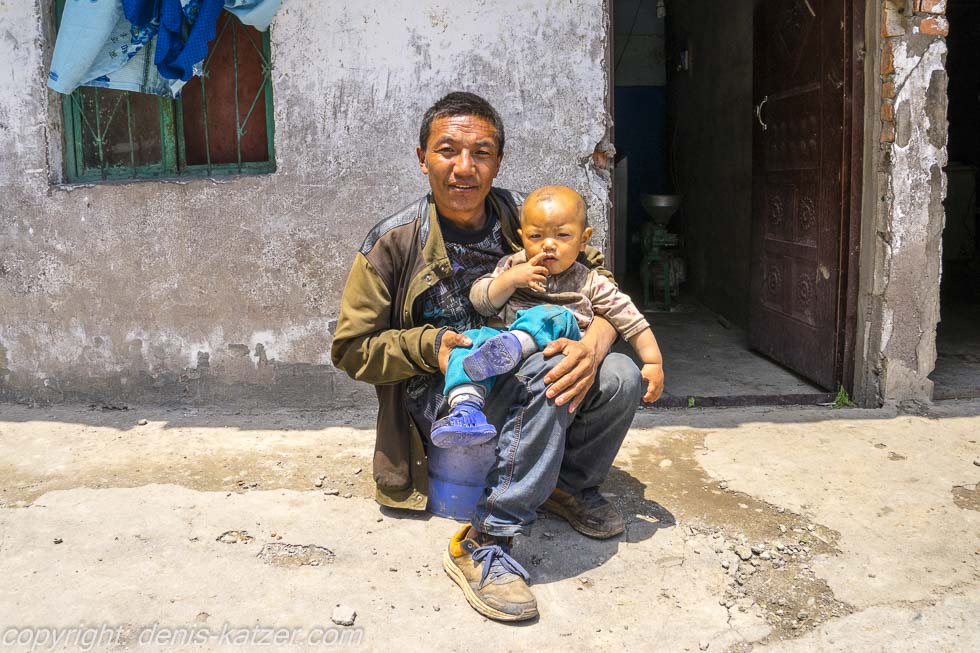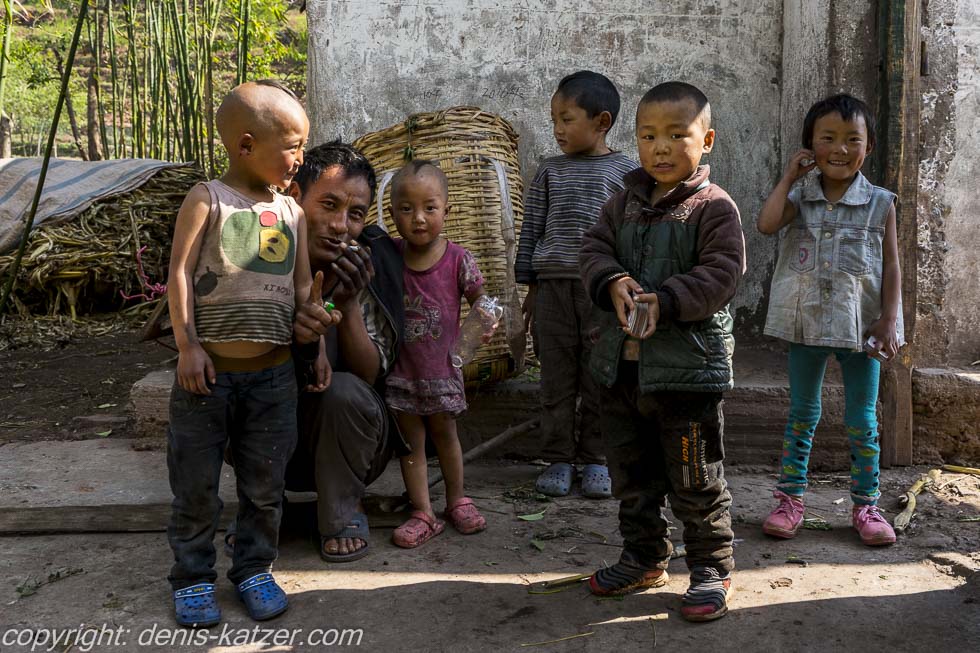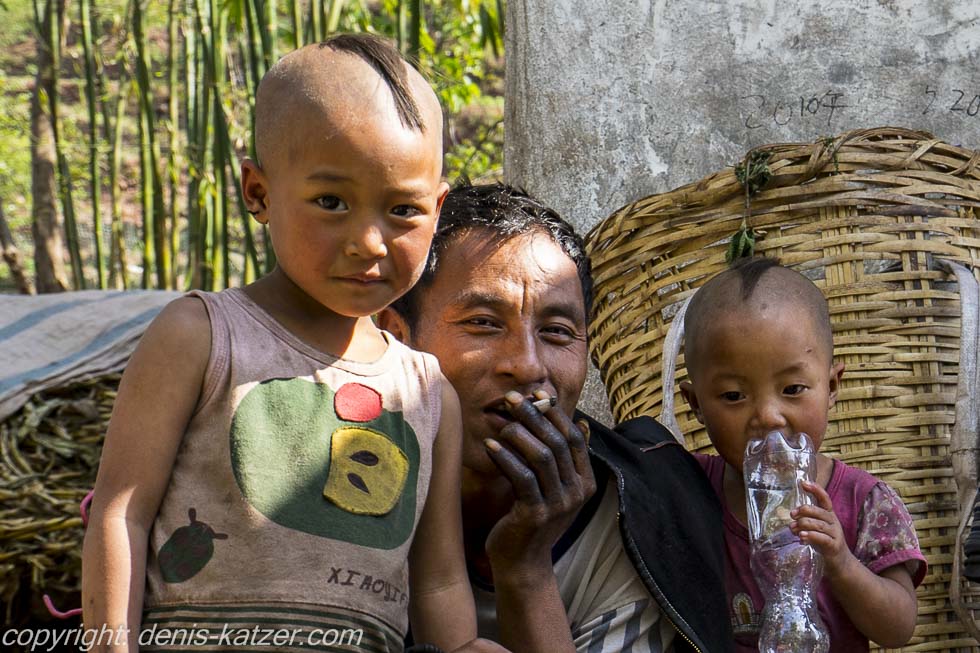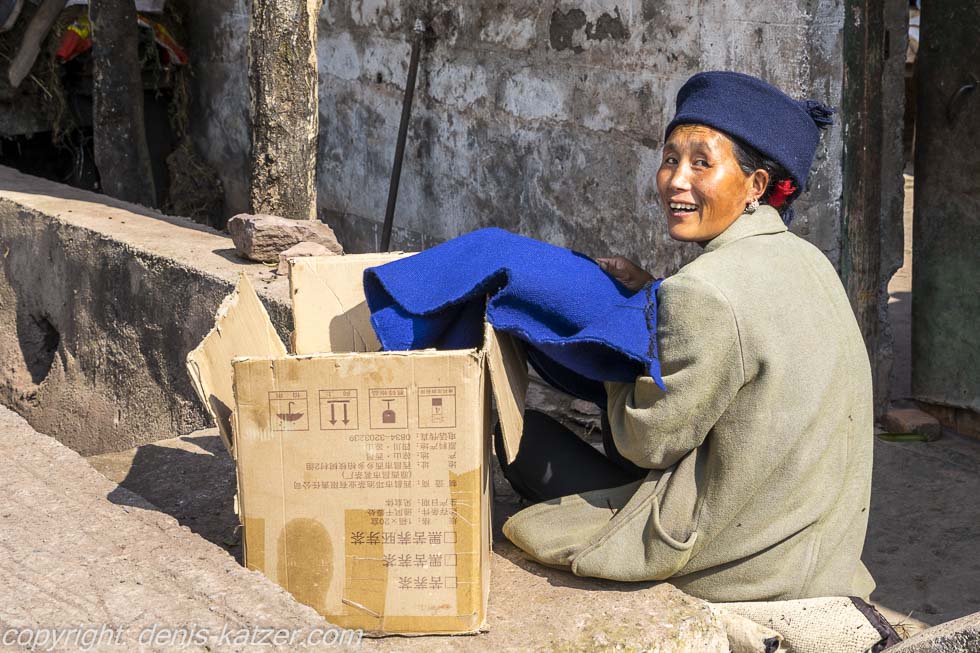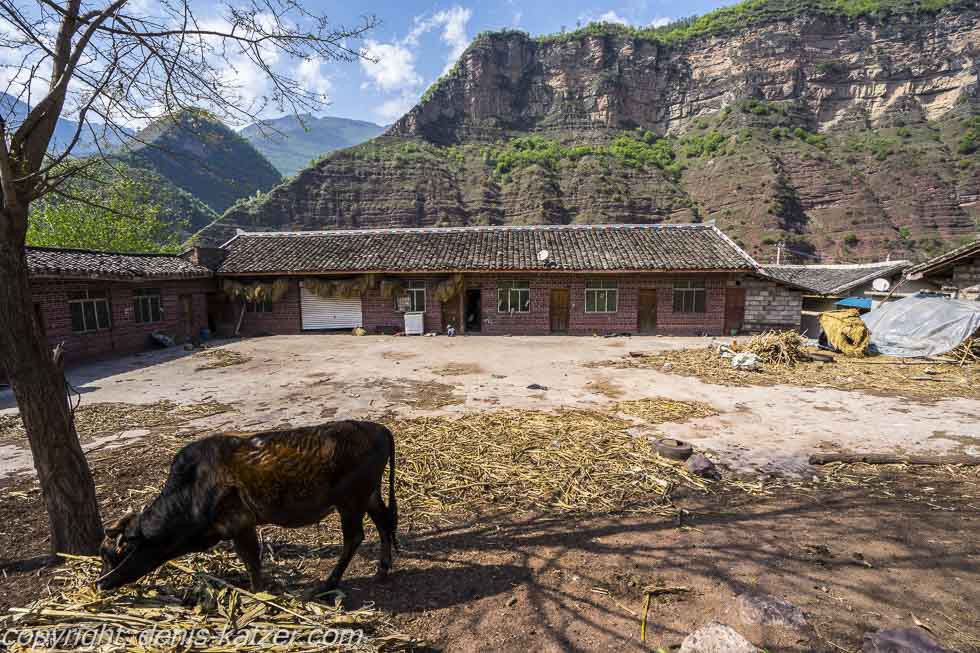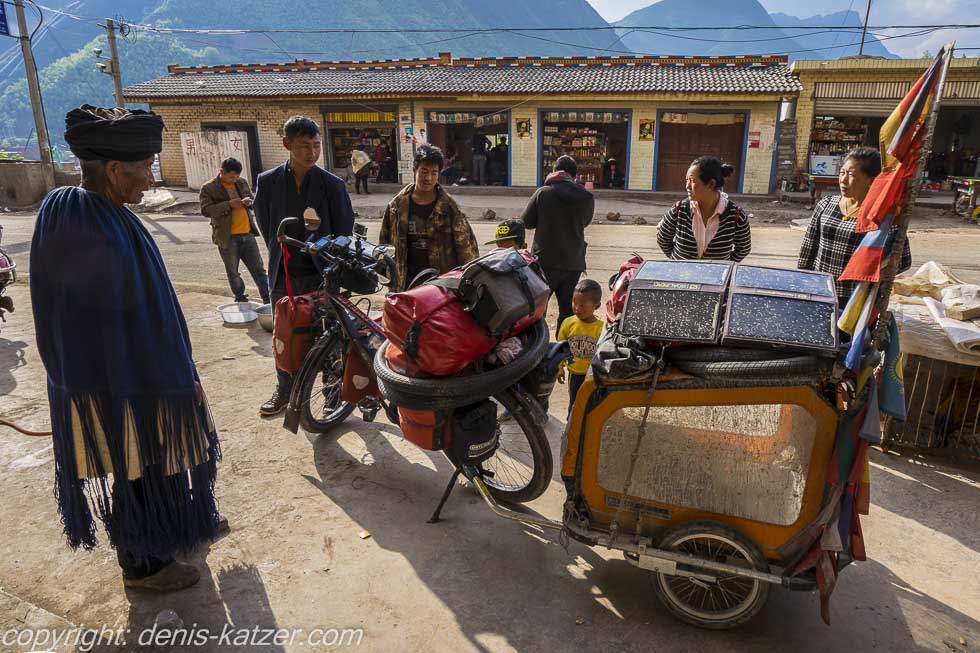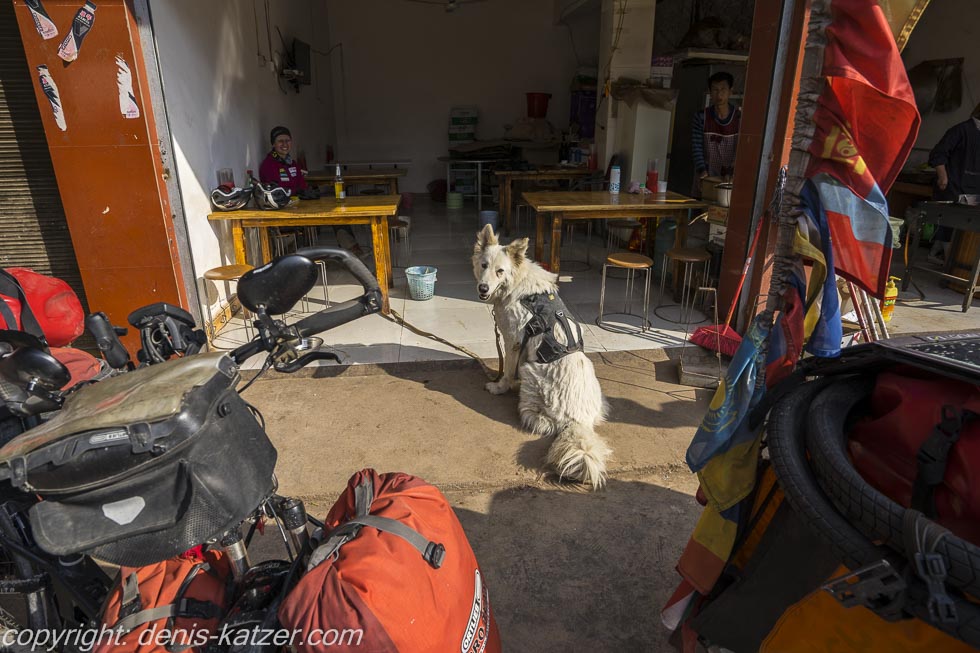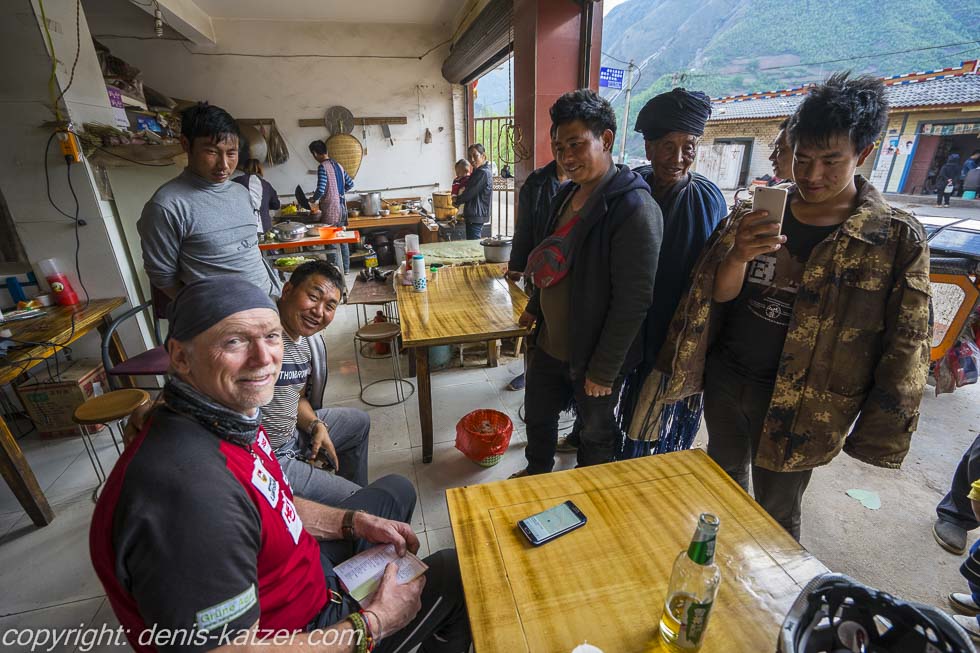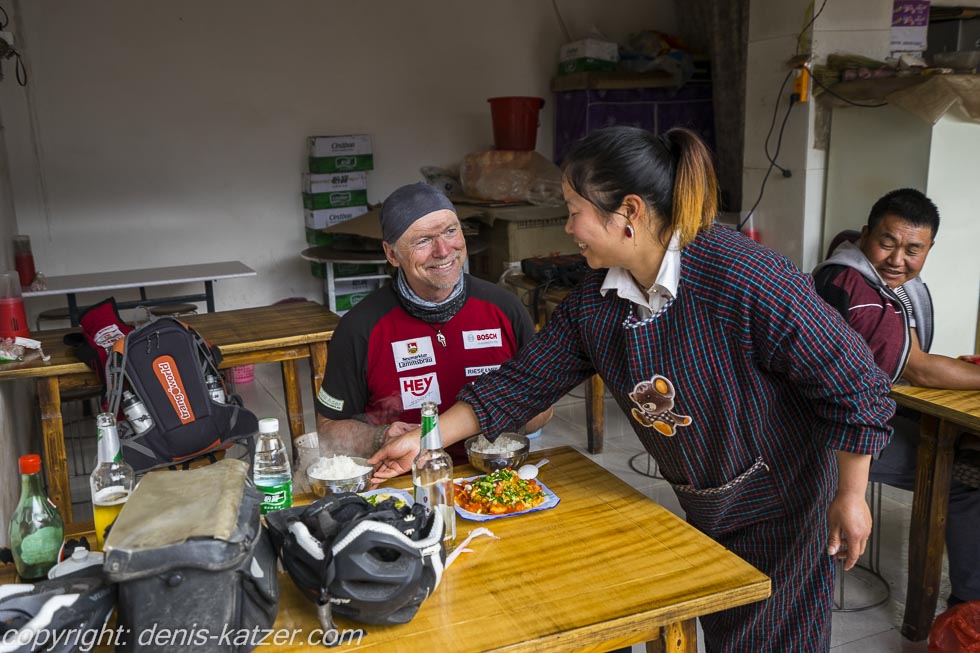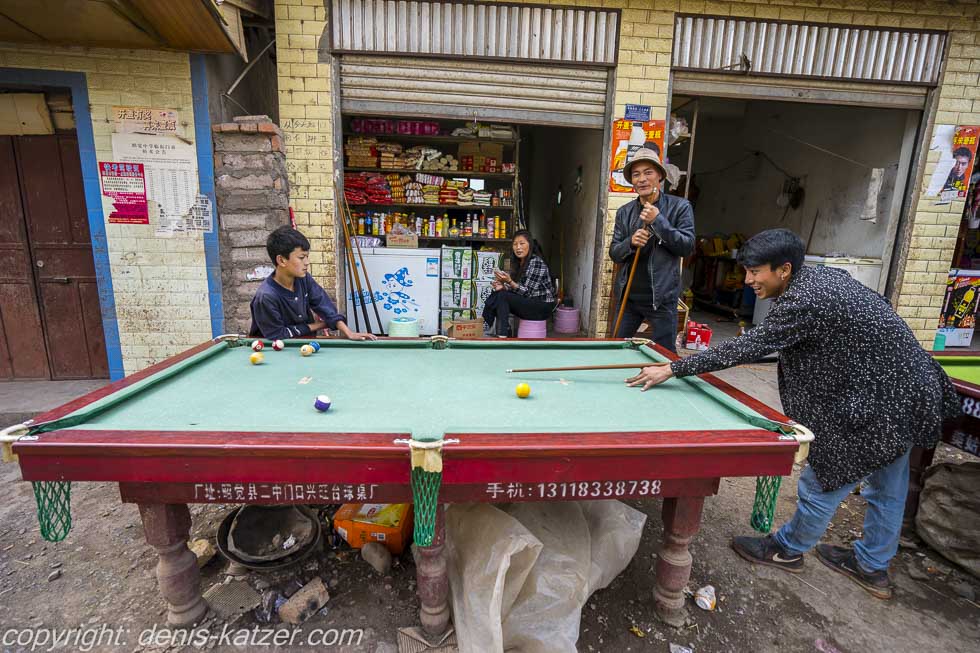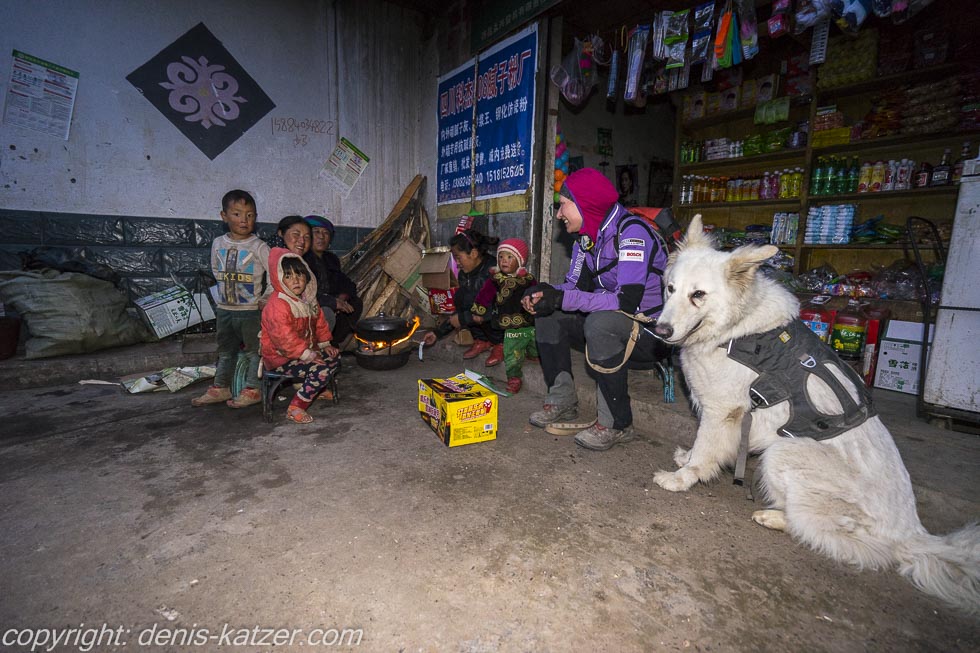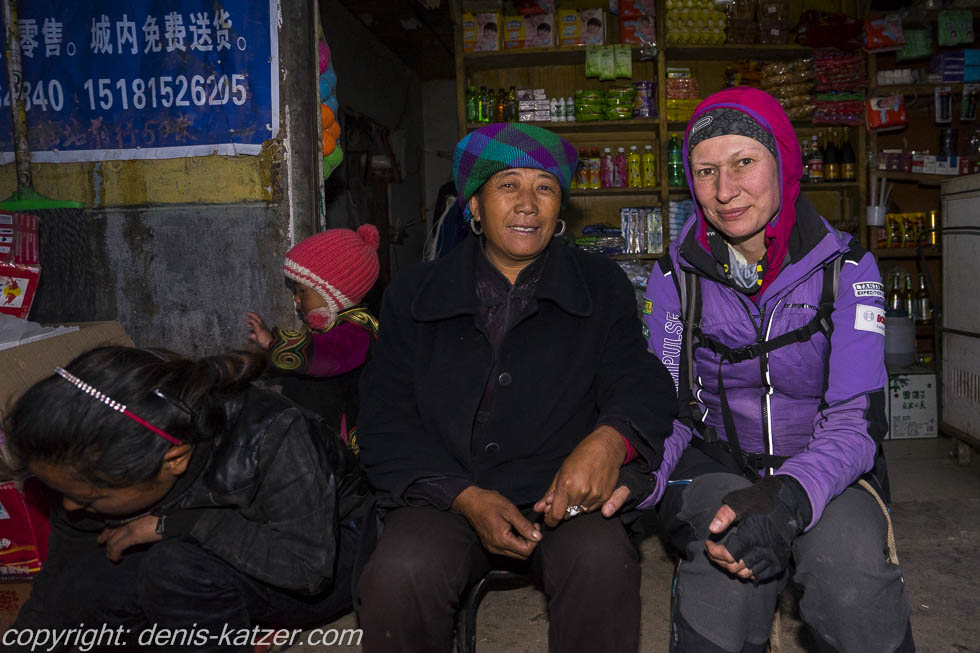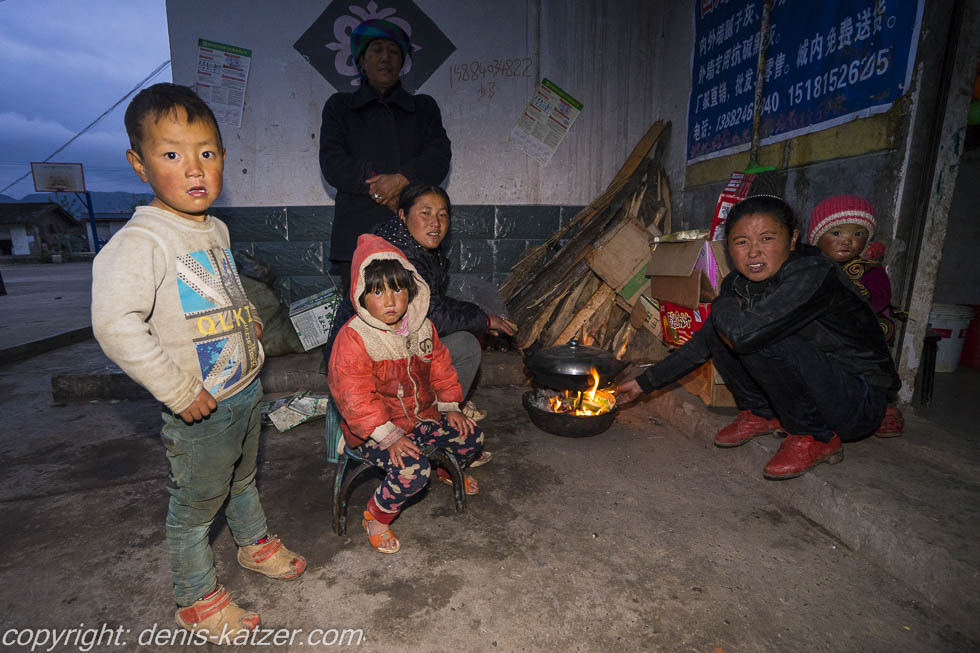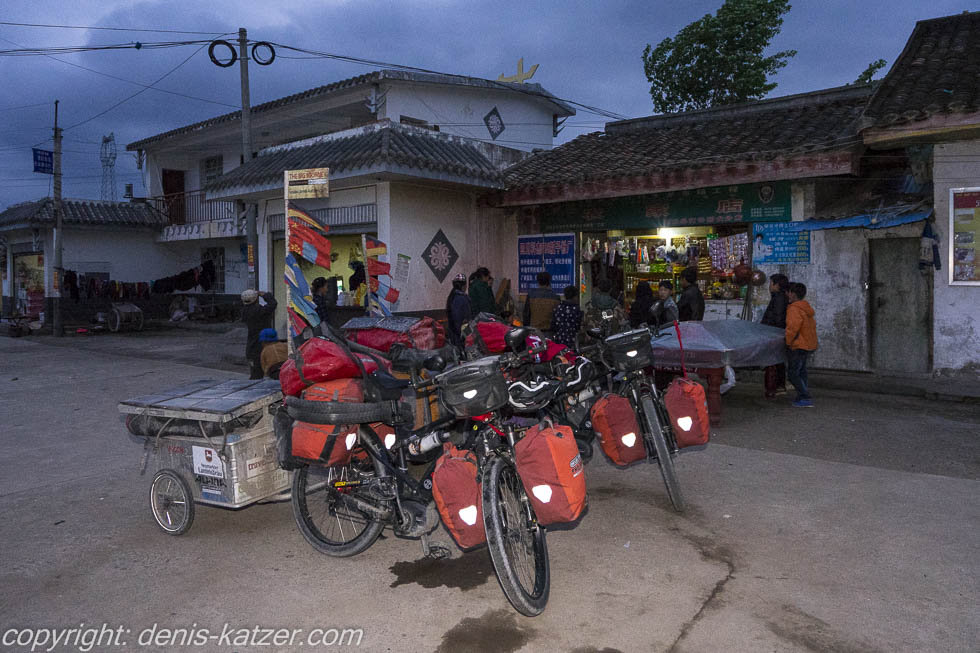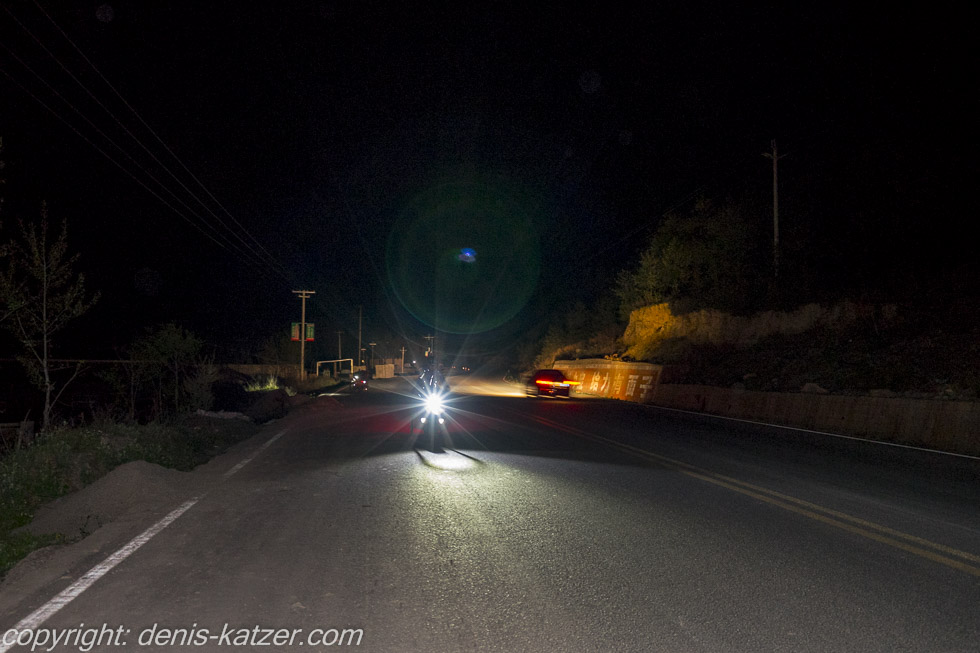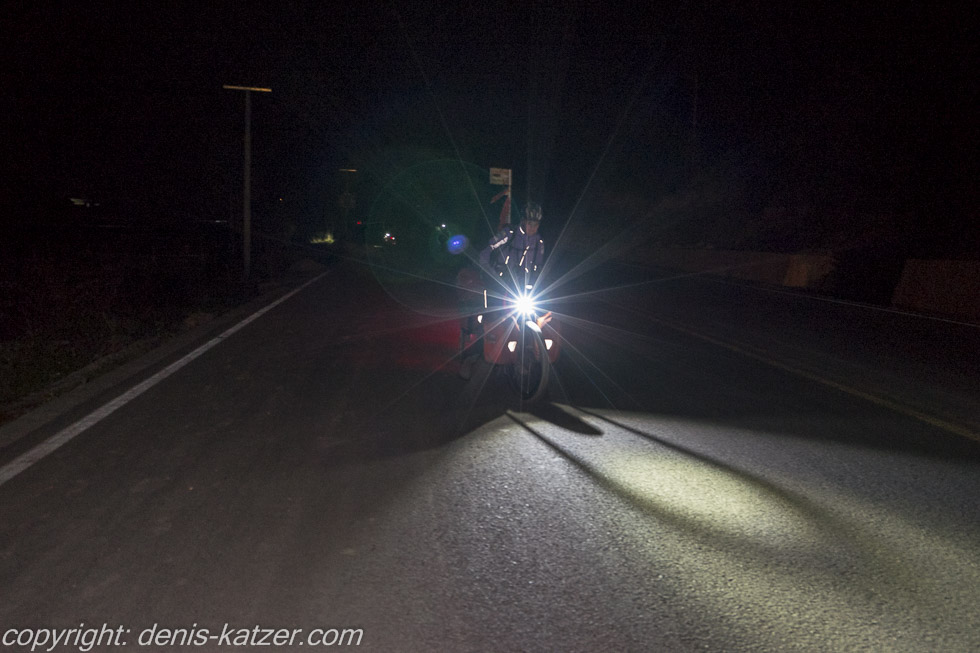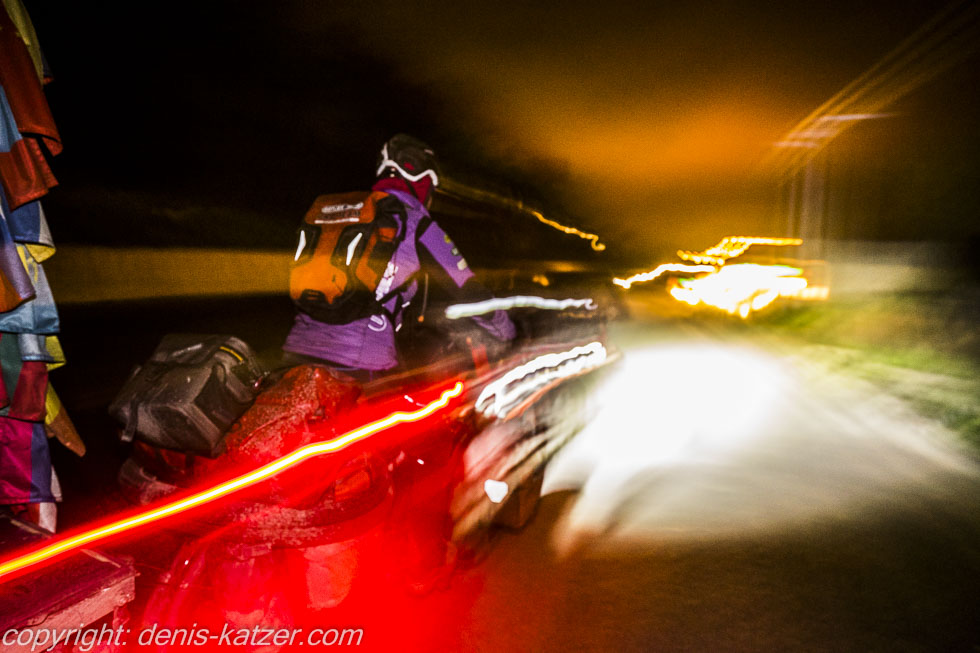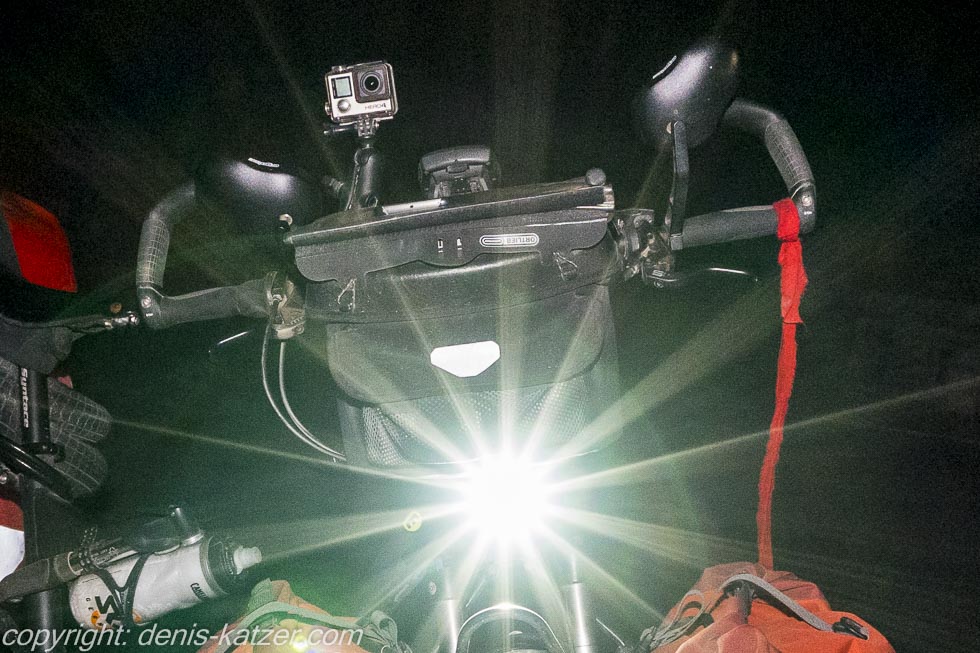
Rockfall, dangerous gusts of wind and bizarre gorges
N 28°00'54.8'' E 102°50'34.4''
Date:
25.04.2016
Day: 302
Country:
China
Province:
Sichuan
Location:
Zhaojue
Latitude N:
28°00’54.8”
Longitude E:
102°50’34.4”
Daily kilometers:
115 km
Total kilometers:
16,639 km
As the crow flies:
77.39 km
Average speed:
15.4 km/h
Maximum speed:
49.6 km/h
Travel time:
7:27 hrs.
Soil condition:
Asphalt / unpaved surface
Maximum height:
2.300 m
Total altitude meters:
33.099 m
Altitude meters for the day:
2.285 m
Sunrise:
06:34 am
Sunset:
7:39 pm
Temperature day max:
24°C
Temperature day min:
14°C
Departure:
07:00 a.m.
Arrival time:
9:30 p.m.
(Photos of the diary entry can be found at the end of the text).
After the successful installation of a new brake system, our journey can finally continue today. This time we are already in the saddle at 7:00 a.m. and let our bikes roll 800 meters down the sometimes steep continuous gradient. To prevent the brake fluid from boiling again, we stop every 500 meters to give the system a chance to cool down. (This text is related to the story “Through my own fault, I narrowly avoided disaster”, where I describe the assembly error I made on our brakes. Also, the following lines are not due to a faulty brake, but to the overloading of our bikes. At this point, it should be mentioned that we are absolutely delighted with the Magura brakes and, without any exaggeration, they have saved us from bad situations on several occasions) “Ouch! It’s bloody hot,” I say as I carefully touch the brake calliper. “Are you pulling both brakes at the same time?” I ask Tanja. “Sure.” “Then try to work a bit more with the front brake. That takes the strain off the rear brake. It’s much hotter than the front brake. It’s also important that you let go of both brake levers briefly from time to time. Or switch from left to right. This gives the brake discs a chance to cool down a little,” I recommend. While we wait on the side of the road to let our brakes cool down, heavy trucks pass us with smoking tires. In front of each tire of the Brummis hangs a hose to which a nozzle is attached. During such extreme descents, water is constantly splashed onto the brake drum. In this way, they prevent the brake systems from overheating. “We can do that too,” I think to myself, which is why I now cool our brake callipers with a splash from the water bottles at every stop. It actually steams and hisses as the jet of water hits it. “Can the brakes take it?” asks Tanja. “Well, if it suddenly rains or we drive through puddles, they are also exposed to water,” I reply.
Again and again there are huge speed bumps across the road. Speedbrakers, which are often poorly announced or not announced at all, remain a danger for us. “Watch out!” I yell, slamming on both brakes to bring my bike down to walking speed. Slowly, the tires roll over the concrete hump. Because of our snail-like descent, we discover a rock cave at the side of the road where people actually live as they did centuries ago. “Done!” I shout as we arrive in the valley without further incident. Immediately one of the black holes sucks us in again. We had already routinely switched on our lights and pulled our breathing masks over our faces. The lighting has also failed in the ten, sometimes four-kilometer-long, exhaust-filled tunnels that lie ahead of us today. Outside the dark mountain passages, the steep mountain flanks are right next to the road. Again and again we see massive steel nets to keep the falling rocks away from the road. Many of the artificially built barriers were completely destroyed by the falling of huge boulders. Steel pillars are bent like wax candles in the Australian summer. Steel nets, full of rubble, arch over the road. We cycle under the heavy load. At any moment, the steel cables, stretched to bursting point, could snap. It seems to me that the weight of the stones is hanging by a thread. The mountain is constantly dropping small chunks onto the road. Driving here is like playing Russian roulette. It’s a matter of time, or being caught by a falling stone is the law of the series. We are constantly looking upwards so that we can avoid any approaching danger in good time. According to the English teacher Richard, six engineers were recently caught in a rock avalanche on this route. Again and again we cycle through sections that are cleared of debris. In some places, falling boulders have left a deep hollow in the asphalt or torn away the guardrail. There is no more asphalt on some sections. Our bikes bump through hollows, scree and over gravel. Water seeps through the rock next to us and collects in large puddles. Since we don’t know how deep the brown sludge is, we roll through it with great tension. At a bend, we try to film the dangerous pass road. “You have to keep going. The rockfall!” a passing truck driver warns us, pointing upwards. As the sun warms up the slopes around midday, the rockfall seems to get worse every minute. Despite the latent danger, the landscape is picturesque, simply breathtakingly beautiful. Time and again I get off my bike to take photos of the unique natural surroundings. The Jinsha River leaves us with an arc in a north-easterly direction as we continue to the south-west. On the mountain slopes we discover small huts covered with blue corrugated iron. “Do the Yi also live there?” asks Tanja, referring to the 9 million-strong people who live in the provinces of Sichuan, Yunnan, Guizhou and Guangxi and are one of China’s 56 recognized nationalities.
We stop to take a few more pictures. Through my telephoto lens, I can see that these are miners’ huts clinging to the steep slopes like swallows’ nests. In this region, people drill into the mountain slopes under inhumane conditions to bring gray rock to light. A little further down the road there is a rattling and smoking. Hundreds of meters above our heads, a wagon unloads its stony cargo onto a ramp. It crashes into a river valley with a deafening noise. Hard-working miners keep the ramp clear with spades and shovels. The rock then lands on a conveyor belt and falls into an iron machine that crushes the inside of the mountain. Coughing, we flee from the billowing cloud of dust that escapes from the rusty, archaic-looking iron thing with a hissing sound. As soon as we sit in the saddle, we greet a few people who obviously belong to the Yi people. They are usually dressed more colorfully than the Chinese, often wear an unusual hairstyle and speak around 30 different languages that have nothing in common with Chinese. Since the city of Leibo, we meet the Yi more often than the Chinese. Their people go back to the ancient Qiang, who are also considered the ancestors of the Tibetans and the Naxi. They are an ancient people who originally come from south-eastern Tibet and migrated to this region from the 2nd century BC. Some of them even immigrated to Thailand, where they still live today. “Hello!” a couple of Yi men who are loading a horse call out to us in a friendly manner. “Hello!” we return their greeting.
The mountain gorges get narrower and narrower. The steep rock faces to our left and right seem so close they want to crush us. “Unbelievable!” I crane my head back to discover the edges of her demolition, outlined by the glistening light. Waterfalls send their white spray plunging into the depths. Sometimes it evaporates halfway, forming a misty cloud that clings to the rock faces. The sun peeks out from a high wall of clouds, shoots a few glistening rays into the damp swath of mist below, whereupon it rises and evaporates as if in slow motion. Brown, cracked rock faces, eaten away by the ravages of time, beset the narrow, man-made strip on which we move. Strong winds blow over our heads, bending bushes and trees, sending even more stones tumbling into the depths than before. To our right, a mountain river winds its way through the narrow valley. Suddenly I see it, a falling boulder that crashes into the river not far from us with a thud. The echo echoes from rock face to rock face. “Please let us get through here without taking any damage,” I send a prayer to the heavens and feel increasing uncertainty. It is a fascinating journey, a journey between the forces of nature, whose immeasurable beauty radiates life and decay at the same time.
The wind is getting stronger. Some of the gusts are now making their way down to us. To our right, we enter the riverbed far below us. The road usually has no crash barrier. Just one step off and you would plunge into the brown flood. Because the gusts of wind come more and more frequently and are absolutely unpredictable, we keep to the middle of the unpaved path. This is the only way we can be sure of not being thrown into the depths by a sudden gust of wind. “My battery’s flat!” exclaims Tanja. We stop and put in new ones for the fifth time today. We still have 40 kilometers to go. Barely a hundred meters further on, my gaze falls on the display of the on-board computer. I have to look twice to believe my eyes, because the supposedly fully charged electricity collector is half empty. “What does your display show?” I ask Tanja. “Three bars!” she replies. “Then two of the batteries weren’t fully charged,” I say, wondering how that could have happened. We stop immediately to give advice. “Didn’t you load them?” asks Tanja. “I’m sure I’ve charged all the batteries. But after the incident with the brakes…? It looks like I must have forgotten the two in the excitement about the brakes. I can’t believe it,” I say a little dejectedly. “And can we still make it to our destination today with one and a half batteries?” “If we use our GoalZero batteries (emergency batteries that are charged via solar in good weather. We also call them joker batteries, which we can also use to charge a Bosch battery half full) charge two Bosch batteries, it shouldn’t be a problem,” I reply. I immediately open the trailer box to connect an empty battery to the GoalZero. Meanwhile, Tanja fills Ajaci’s bowl with water so that he can quench his thirst. “The GoalZero is empty too!” I shout to Tanja as a strong gust of wind hits our bikes. I jump up in a flash, hold my bike and keep it from falling into the gorge. “Puuuhhh,” I groan. Tanja immediately rides her horse a few meters further and leans it against a rock. At this moment, another gust of wind hammers into the valley, grabs Ajaci’s tin bowl and hurls it into the abyss. “No!” shouts Tanja. “Maybe she got stuck on a ledge,” I guess, stepping to the edge of the road to look down. “There, look! It’s actually lying on a rocky outcrop,” I say happily. “I’ll get them.” “Just make sure you don’t slip,” I admonish, taking care of the batteries again. “There’s the bowl,” says Tanja, her whole face beaming as she climbs out of the gorge minutes later. “And what about the joker batteries?” she wants to know. “Bad news. Because we haven’t used them all winter, one of them has completely discharged.” “Does that mean we can only charge one battery?” “Yes, we can. But that’s not enough for us to get as far as Zhaojue.” Dark storm clouds form around the mountain peaks. The first fat drops fall. “We have to get out of here,” Tanja urges us to hurry. “Yes,” I agree with her and climb into the saddle.
I sit thoughtfully on my bike and make all kinds of calculations about how we might still be able to make it with our remaining energy from one and a half batteries. We switch to a lower mode to save electricity. As we turn around the next mountain range, the nasty clouds remain in the mountains behind us. Then, at 17:00, a small village appears. “Let’s eat something here and charge our batteries,” Tanja suggests, pointing to a small street restaurant. Without further ado, we park our roadtrains in front of it. The landlord lets me put our four-pin plug into the socket. Four batteries are now charging while we wait for our food. It only takes minutes for word of our presence to get around the Yi village. Old men with dark turbans, wearing blue felt capes with long shaggy hair hanging from them, stand in front of our superbikes in amazement. Young people discuss, point to the batteries lying on the table in the restaurant and at the same time to the small Bosch motor. They laugh and offer us cigarettes which we, as non-smokers, thankfully decline. After eight months of listening to Chinese, their language sounds strange to us. “Can we take a selfie with you?” we understand and cheerfully make ourselves available. In this respect, they are in no way different from the Chinese, who still want to have a photo of foreigners everywhere, in every nook and cranny. A man at the next table wants to invite us to dinner. So as not to offend him, we decline with the utmost politeness. It doesn’t help. The Yi is not dissuaded and pays for the entire lunch and drinks. I immediately get up and fetch a postcard from our trailer on which Tanja and I are photographed with bikes. With both hands, as politeness demands, I hand over the well-traveled fan card. The man beams, thanks him several times and shows off his gift. Others also want one of these cards from us now. “Sorry, we don’t have many of those,” I say. Our patron gives us an open smile. Then he says goodbye and leaves the restaurant. “Amazed by so much hospitality, we sit there a little embarrassed. I would have liked to give Yi more than just a photo of us, but who knows, maybe the little picture is actually an appropriate gift for him in return? I think of the cab driver in Chengdu who couldn’t change our 100-yuan bill and wanted to give us the ride for free. It’s rare for something like this to happen on our planet.
After one hour, the battery is one third full. If there aren’t too many more hills, we should be able to make it,” I say, packing her into the trailer box. We say goodbye to the small group of people and leave the village. The road immediately leads upwards. The display of the just-charged current collector collapses from seven to three kilometers. The sun is already low when we insert the second battery charged in the restaurant. It is empty again after three kilometers. We are now at an altitude of over 2,000 meters. The GPS tells me that I have already climbed more than 2,000 meters and covered 100 kilometers today. A great achievement, but we are still a long way from reaching our goal. We insert the last full battery, number six, which we have saved for last. There are still about 18 kilometers to the finish. A cold wind blows at our backs. We stop and put on our windstopper jackets. Then the journey continues. In front of us, the road suddenly winds upwards in wild hairpin bends. “Oh no! Do you see that?” asks Tanja, pointing to the unexpected mountain. “We’ll never make it!” she shouts. “How much more do you have left?” I ask. “11 kilometers and yours?” “15 kilometers!” At first we think it’s some kind of mirage when another village appears just before the mountain. “We have to load!” shouts Tanja. I keep pedaling towards the mountain and wonder if we can still make it. “If it’s flat from the top of the mountain, or even downhill, the load is enough,” a thought flies through my head. “What’s wrong with you? Why aren’t you stopping?” it shouts behind me. I pull the brakes. “I don’t know. I could imagine reaching our destination.” “And if not? Then we’ll be stuck somewhere in the mountains in the dark. Even if we find a place to pitch our tent. What will we do tomorrow then?” argues Tanja. “Okay,” I say with conviction, turn around and drive back to the small village. We pull the brakes again on a larger concreted area. Simple huts line the area. At a tiny grocer’s store I ask if we can charge our batteries. The man shakes his head. Tanja hands him 10 yuan. (1,34 €) A smile twitches across his face. The four-pin plug is quickly in the socket and charges four of our energy storage units again. Here, too, a large crowd gathers around us in no time at all. The sun has long since set. Women and children sit around a cardboard fire. An iron rack holds a wok in which potatoes are cooked. A Yi woman offers us a seat by the warming fire. Children run around our bikes, touch everything and chase Ajaci around. “Ajaci, come here and make room,” Tanja frees our faithful four-legged friend, who settles down next to the small fire, grunting contentedly. After 30 minutes, the shopkeeper complains. “Electricity is expensive”, we understand. Although we know that 10 yuan is more than enough to cover the cost of getting all our batteries full, Tanja hands him another 5 yuan note. (0,67 €) Another grin flits across the man’s face. By now it’s 8 p.m. and pitch dark. Children are still standing in front of our bikes. Although we are dog-tired, we remain vigilant. Something quickly disappears from the panniers. Although the people here don’t give the impression of wanting to steal anything. From a loudspeaker in the store next door, loud music suddenly booms across the dark concrete square. The potatoes are cooked. Everyone present eats one of them. We are also offered the refreshment that we refuse out of politeness. It is 8:30 pm when the batteries are a third full. “That should get us as far as the city,” I say and take it off the grid. As we set off, the women have been dancing to the music pounding out of the loudspeakers for some time. They swing their legs to the beat, run in circles, separate to form a new circle. Without a doubt, it is a traditional ancient dance of the Yi. “Zaijia”, we say goodbye in Chinese. “Zaijian,” it echoes back.
Our headlights eat their way through the darkness. In third gear, you climb up the slope. To save energy, I let Ajaci run alongside me. We are now a well-rehearsed team. Tanja hangs back. I stop. The strong beam of light from her lamp dances up the mountain. The deep barking of dogs comes from a hamlet next to the road. The blackness of the night looks spooky because of the cloudy sky. The altitude meter climbs to 2,100 meters. The battery still has a range of seven kilometers. I’m reassured because we still have the charged batteries from the grocery store in the box. We take one bend after another, when suddenly a strong beam of light sweeps over the ridge like a beacon. “He’s probably from the city,” I think, pedaling on. We seem to have reached the highest point at 2,300 meters. I stop and wait for Tanja, breathing heavily. “Are we upstairs?” she asks, stopping next to me. “I think so.” In fact, a brand new, wide asphalt road now leads downhill. A few vehicles come towards us and light up the forest at the side of the road with their headlights. Signs appear, the first houses, then a wide bridge leads us over a river into the town of Zhaojue. After a 14 ½ hour day, 115 kilometers and 2,300 meters of altitude, we reach our accommodation at 9:30 pm…
If you would like to find out more about our adventures, you can find our books under this link.
The live coverage is supported by the companies Gesat GmbH: www.gesat.com and roda computer GmbH http://roda-computer.com/ The satellite telephone Explorer 300 from Gesat and the rugged notebook Pegasus RP9 from Roda are the pillars of the transmission.
